Regional Funds Online Magazine



JUNE 2023 N. 37 ISSN 2784-9465 SSN 2704-6540
Director’s Editorial
The Communication Award 2023 is for all of you!
Europe’s Digital Decade: Closing the Societal Gaps and Divisions
Microfinanza Workshop in Bologna
Track-IN project presented their first results at the Conference ACTIVATING NEETS: CHALLENGES AND SOLUTIONS ACROSS EUROPE celebrated in Naples (Italy)
Theme of the month
The European Year of Skills - Presents its flagship event, the Making Skills Count Conference
A best practice implemented by Microsoft in Greece - The digital skills demanded by the new labour market
Learning digital skills: insufficient opportunities or reluctance?
Developing digital powers: How youth are conquering the world of digital skills
Bridging the Digital Skills Gap for Youth Employment: Experiences of Project SEPAL
Acquiring Skills in the Digital and Green Transitions Era: Empowering NEETs for the Labor Market
The new needs in eco-sustainable and digital professions. How the labour market face the new skill challenges
The new digital world around the corner: Transition in the labor market
Digital and green transitions brought to the labour market challenges and opportunities, calling for new skills of the workforce. The European Year of Skills aims at boosting competitiveness, investment in training and upskilling opportunities to make sure that workers acquire the skills demanded on the labour market, including digital skills. How much young people follow trainings on a regular basis? Which are the needed digital skills in our era?
Digital and green transitions brought to the labor market challenges and opportunities, calling for new skills of the workforce. The European Year of Skills aims at boosting competitiveness, investment in training and upskilling opportunities to make sure that workers acquire the skills demanded on the labor market, including digital skills. How much young people follow trainings on a regular basis? Which are the needed digital skills in our era?
How much young people follow trainings on a regular basis? Which are the needed digital skills in our era? The case of Italy.
In today's rapidly evolving job market, the digital and green transitions have brought forth new challenges and opportunities. To stay competitive, young people must acquire the skills demanded by employers.
The digitalization of the labor market - An analysis of the digital skills of society and youth in Extremadura, Spain
1 Regional Funds Online Magazine
3 5 7 9 11 15 16 18 20 22 23 25 27 28 29 31 34 35 37
Contents
Interview Ania Krupinska
The future of work for NEETs in a circular economy
Publishing a paper on the assessment of the implementation of the Youth Guarantee Policy in the EU South.
2
Circular
the Projects
Project
Digitalisation enables a
Economy From
Blue Generation
updates
Interview Iwona Chlubek
financing
The Successes so far of Cider from Hardanger Contributors & Credits 39 42 42 45 47 50 53 54 56 58 Regional Funds Online Magazine
Summary of Workshop “Funding and
carbon capture and storage (CCS) in Central and Eastern Europe”
Director’s Editorial
Dear Friends of the Regional Funds Mag,
CONGRATULATIONS to our fantastic Projects!
it is with a great satisfaction that I am announcing you that our Regional Funds Online Magazine, previously the Youth Employment and Regional Cooperation Online Mags, won an award!!!!
The Communication Awards 2023!
It is, for all of us, a great and emotional results after those years of collaboration, a success that we dedicate to our Projects and their engagement, because we wouldn’t have won it without their constant contributions, feeding the of the Mag.
Mateusz and Francesca, it was a surprise for them, received the award in Brussels during the Annual Communication Workshop, and their first thought was «we have to tell a big thank to the Projects and all the collaborators helping us».
Again, thank you. And we hope you will be proud of that as we are!
I am very happy to write to you in this moment, because of this great news, but also because, finally, I was able to participate to some physical events, talking and listening to a lot of people, which are now real friends. The nice news is that we will be present as well at some other future activities, where also the FMO is invited.
This was not to be taken for granted at the beginning. But we, all together, managed to go beyond the idea of a simple group of Projects, each one with their separated activities. And I hope I have been able to stress this concept when I saw some of you together.
During these meetings, the important opportunity we have is not only to evaluate you: in addition to that, indeed, we can touch with hands the impressive work that all the Projects are doing to find innovative solutions, two words that are not only remained impressed black on white on our papers or websites. And this is a great goal for all of us.
And guess… in all the sessions I participated to, I had the impression that the topics we are proposing to our readers perfectly fit. For sure you will have the occasion to read more, but I would like to re-cap at least three concepts that, in my opinion, are reflecting some of the most important and urging needs of our time: digitalization, green transition and skills.
Not surprisingly, this issue will deal with digital and green transitions and the challenges and/or opportunities brought to the labour market, calling for new skills of the workforce, because the need to improve and adapt skills became an imperative. And again, as we repeated several times, we are into the European Year of Skills and our Projects are perfect examples of how those competences could be emphasised.
3
Regional Funds Online Magazine
To have a confirmation, read our summary about the Conference organised by the European Year of Skills on 8-9 June, the Making Skills Count Conference.
Before ending this usual intro, in addition, I have waited for Mateusz and Francesca, which have been in Brussels for the Annual Communication Workshop organised by the FMO, since I was anticipated that one of the main topics discussed, together with the presentation of our Mag as best practice which turned into a fantastic award ! , was related to AI and our use of those new tools. Human beings are a bit afraid of being practically substituted by intelligent machines, and I am afraid too. But the interesting and positive thing, which is related to digitalisation, is that we could learn new skills, adapting our competences to our changing societies and, basically, to our target groups and their specific needs, costumising our actions in order to reach greater results. What if we launch a new ‘topic of the months’ since AI is already an urging issue in the top of all agendas?
After all, mentioning Tom’s piece, we are leaving the Europe’s Digital Decade but, as Toms says, there are still societal gaps and divisions. Gaps which are related, again, to some of the targets we analysed during the Projects’ events, such as for example the rural young about which we talked in Napoli during the Track-IN conference. You see… everything is interrelated, exactly as our Projects are interlinked.
We are living a moment, or better an era, which could be compared to the invention of internet and the world wild web. If you agree with me, we can say out loud that it will be challenging, but needed, to concentrate our efforts more than ever. For this issue, I would like to ‘positively exploit’ two titles from SEPAL, which are in my opinion summarizing our actual era: ‘Learning digital skills: insufficient opportunities or reluctance?’ but…. ‘Developing digital powers: How youth are conquering the world of digital skills’! And I also discovered, that Raise YOUTH Project has launched a real Digital Toolbox to help build these digital capacities, an online repository of digital tools, trainings and other resources that can be used by young NEETs, entrepreneurs and companies alike. And it is not the only news I learnt while reading the rest of the contributions going towards the same direction. From the Digital Skills Initiatives of Project L.I.K.E., to the link between eco-sustainability and digitalization made by StayOn, or the one existing between digitalization and circular economy suggested by the Project Circular Based Waste Management, or again to the analysis made by Project YES!. I can only congratulate to our Projects for the rich set of insights provided, which come perfectly in time with our suggestions.
Therefore the only thing left to say is… go and read !
And stay tuned for upcoming news and activities!


 Gian Luca Bombarda
The Fund Director
Gian Luca Bombarda
The Fund Director

4
Regional Funds Online Magazine
The EEA & NORWAY GRANTS Communication Award 2023 is

for all of you!
The EEA & Norway Grants’ Annual Communication Workshop, held in Brussels on 12th and 13th and organised by FMO at the EFTA House, has been an important opportunity to exchange with National Focal Points, Embassies and Project Officers, challenges and innovative solutions. The first day, for example, a session was on the use of AI, not surprisingly we will talk about digitalization in this issue.
The second day, dedicated to the presentation of Best Practices, has been a surprise. Not because we presented the Regional Funds Online Magazine as a Best Practice. But because we received an award, singed by EEA & Norway Grants, and we were at first sight surprised, positively of course.
We thought, later on, to the commitment existing behind this ‘product’, to all the people working behind it, especially for technical points of you and external volunteer contribution.
But above all, we thought about ‘our’ Projects. This Online Mag, previously the Youth Employment and the Regional Cooperation Online Mags, couldn’t exist without the EEA & NORWAY GRANTS funded Projects.
We always believed that an increased dissemination, thanks to our Platform, would halve helped to spread the innovative solutions developed to face common challenges.
Today, with this award, we are even more convinced of that. And we truly believe that Team work, with the constant support of FMO, allow us to talk about a real Family.
We are very proud of you, of our work, and we can only hope we can share this happiness.
Thanks for your engagement, this award is for all of you!
Francesca Bombarda Mateusz Wiśniewski & the entire Fund Operator
5
Regional Funds Online Magazine

6 Regional Funds Online Magazine
Europe’s Digital Decade: Closing the Societal Gaps and Divisions
“Those who came before us made certain that this country rode the first waves of the industrial revolution, the first waves of modern invention and the first wave of nuclear power. And this generation does not intend to founder in the backwash of the coming age of space. We mean to be part of it-we mean to lead it.”
John F. Kennedy
The 4 Industrial Revolutions
Humanity’s march through the centuries has been intermittently propelled by industrial revolutions. Throughout history, people’s dependence on technology has increased exponentially, for better or for worse. People used, managed and tried to perfect technology and bring it to the next level. This gave birth to the concept of the industrial revolution. Currently we are going through the fourth industrial revolution.
The first Industrial Revolution 1765
The First Industrial Revolution began in the 18th century through the use of steam power and mechanisation of production. The socio/ economic ramifications of this was that agriculture started to be replaced by industry as the backbone of the societal economy. There was a parallel massive extraction of coal, creating a new type of energy, that subsequently speeded up the manufacturing of railroads, thus accelerating the economy. Developments such as the steamship or, a century later, the steam-powered locomotive brought far-reaching changes as now humans
and goods could move great distances in fewer hours.
The second Industrial Revolution 1870
The second industrial revolution engendered significant technological advancements in industries that helped the emergence of a new source of energy—electricity, gas, and oil. It was also the Henry Ford era in car production that heralded the idea of assembly line production. We also witness the nascent seeds of the communication and transport phenomenon with the telegraph and telephone, and the car and plane.
The Third Industrial Revolution 1969 History waited another 100 years before the Third Industrial Revolution ushered in nuclear energy. It also oversaw the rise of electronics, telecommunications and computers, thus opening the doors to space expeditions, research, and biotechnology through the new technologies.
The fourth Industrial Revolution: Time was impatient and didn’t wait another century for the fourth industrial revolution, one
that we are currently living and experiencing, with its outer limits still undefinable. The Internet arrived around the beginning of the third millennium, welcoming us to virtual reality worlds. This fourth Industrial Revolution is characterised by the application of information and communication technologies to industry and is also known as "Industry 4.0". It builds on the developments of the Third Industrial Revolution and has the power to change the way that people work. It can pull individuals into smarter networks, with the potential of more efficient working. The digitalization of manufacturing will change the way that goods are made and distributed, and how products are serviced and refined.
Societal progress and health cannot only be measured by industrial advancement, economic growth and rising GDP figures. The distribution and division of wealth and opportunities casts a cold eye on equitable standards of living. The emergence and development of digital technology over the last 20 years has had a profound effect on people and the way they live and work.
7
Regional Funds Online Magazine
As more aspects of society become dependent on digital resources, there is pressure on individuals to be able to use and interact with them. This increases the need for digital skills. Digital divide is the term that describes the uneven distribution of information and communication technologies in society. This encompasses differences in both access and usage of computers and the Internet between, in the first instance, industrialized and developing countries (global divide), and then between various socioeconomic groups within single nation-states (social divide), and finally different kinds of users with regard to their political engagement on the Internet (democratic divide). In general, those differences are believed to reinforce social inequalities and to cause a persisting information or knowledge gap amid those people with access to and using the new media and those people without such skills and access.
A recent report in Ireland found that 42 percent of Irish people describe themselves as being ‘below average’ for digital skills, highlighting a gap in digital literacy that exists within the country. The report shows that age, social class, region and level of education is closely correlated with levels of digital skills.
new technologies to the market from nanosensors to RNA sequencing - the above caveats should be taken into account. Commission President Von Der Leyen’s promise to make the 2020’s Europe's Digital Decade, must also ensure that this Industrial, technical and now digital revolutions are inspired by people, managed by people and are ultimately for people – all people.
I leave you with the words of the Commission President: “We are putting out the investments and the strategy. But the key to our success lies in Europe's innovators, world-class researchers – in the people who have made our continent prosper through the decades. Europe is the continent where all the industrial revolutions have started. And Europe can be the home of the next industrial revolution too. Let's join forces to make it happen.”
Thomas Mc Grath

 Our Irish Journalist
Our Irish Journalist
As we move further and further into the fourth industrial revolution that sees, inter alia, the building of ultra-secure satellite communication system thanks to quantum technology; the use of artificial intelligence to improve animal health in farms and bringing
8
Regional Funds Online Magazine
Microfinanza Workshop in Bologna
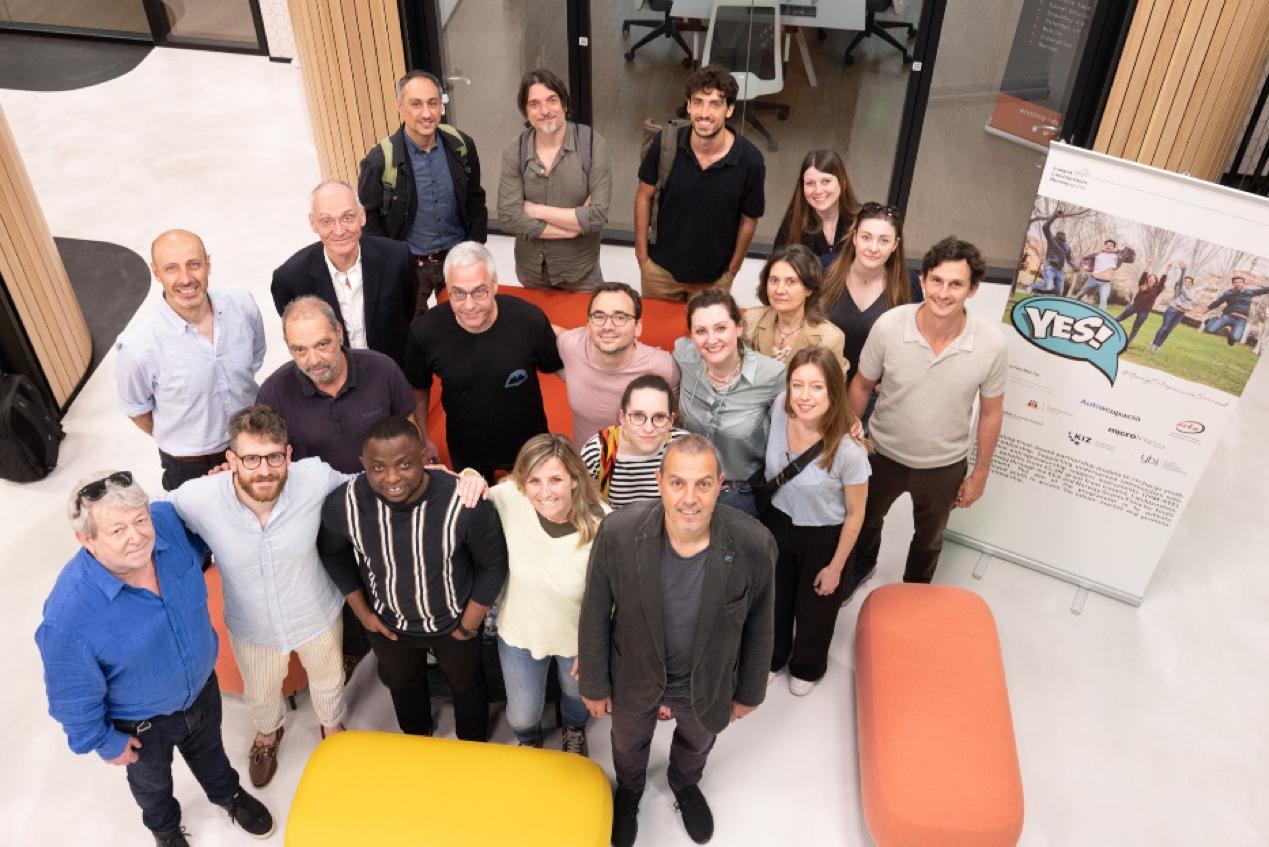
On May 25th and 26th, Microfinanza organized the 6th Workshop of YES!Young Entrepreneurs Succeed project in Bologna.
Katia Raguzzoni from Microfinanza opened the Workshop by presenting the project's challenges and goals in this final stage from the Italian point of view.
Yiorgos Alexopoulos, coordinator and lead partner of the project for the Agricultural University of Athens, opened the discussion on some key aspects of the implementation of the project. Through YES!, the partners had the opportunity to work with a wide range of local partners, with thousands of neets, by using a holistic approach to understand Neets’ needs in terms of training, job orientation, accompaniment to business creation, mentoring, in almost all sectors of the labor market.
The project enabled the development of partners' networking by expanding the services and activities of the partner facilities to other regions, specifically among the less developed ones, involving different and new target groups. The project's partners need to capitalize on these experiences and territorial partnerships for future projects. Therefore, the project went through many external difficulties, and It was able to adapt and rethink activities for better effectiveness.
In the second part of the Workshop, Cristiana Gaita, representing the Found Operator, offered a comparison of the different approaches of the partners focusing on the impact of the project, how it was measured, the relevance of the activities proposed, and how the partners were able to deal with the different difficulties encountered on the way.
The second day of the Workshop was introduced by Giampietro Pizzo, president of Microfinanza, who presented some data about the condition of Neet in Italy, trying to draw new perspectives of the project and propose new answer to the phenomenon of Neets that in Italy, as in other EU countries is continuing to grow.
Gianluca Bombarda, director of the EEA & Norway Grants Fund for Youth Employment, presented some of the Fund's achievements and perspectives, announcing the leading themes of the next FO program, with the same objective to reduce the social and economic gap of vulnerable groups, economically marginalized regions and underfinanced sectors.
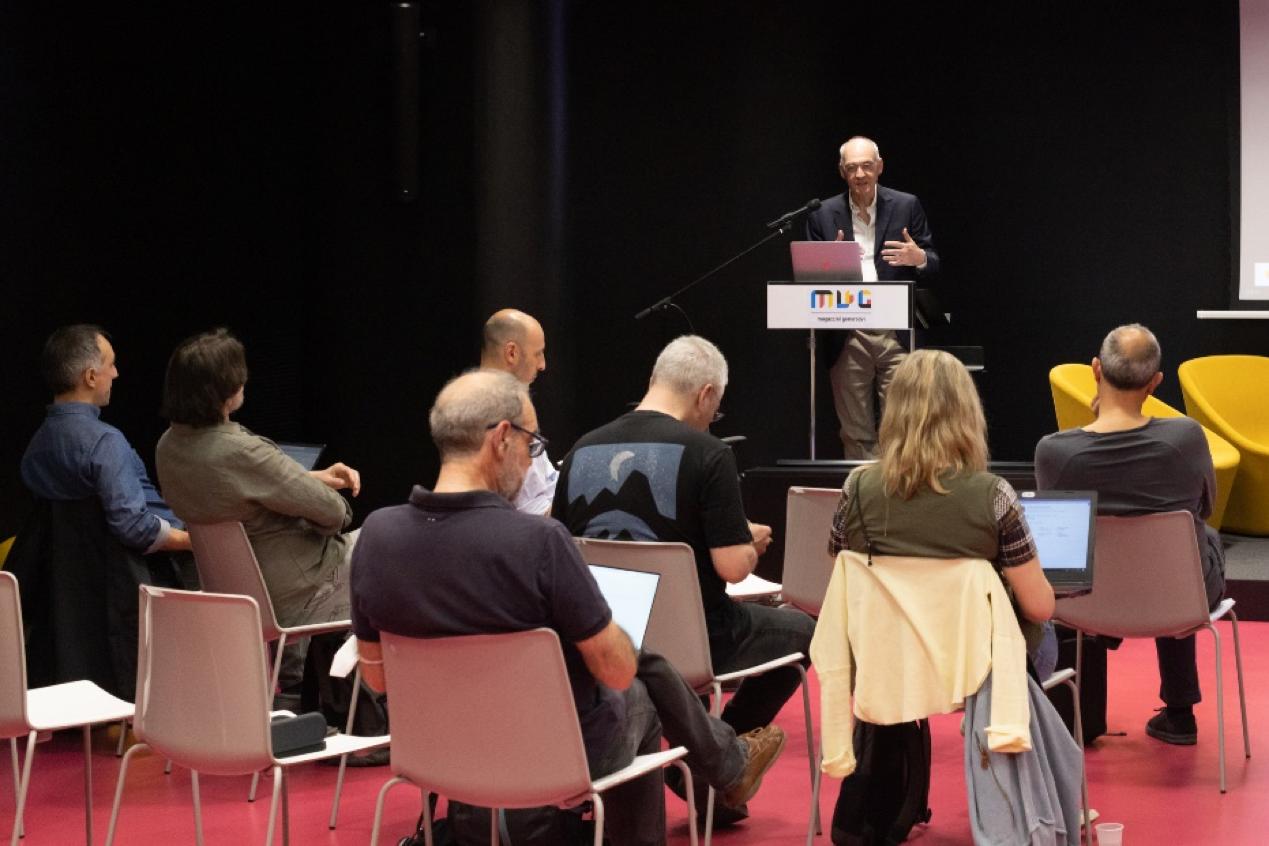
9
Regional Funds Online Magazine
Laimomo, Cefal, Educativa di strada, and Bangheran, some territorial partners, operating in the Emilia Romagna region, that work with the same target group, have been invited to the Workshop. They presented their approach with young people, nonformal education, access to digital skills, "remotivation" of young people through training, and insertion into the world of work. The experiences presented were implemented in urban and rural contexts, and disadvantaged neighborhoods, involving very different target groups of young people.
One of the common elements that emerged in the discussion was the need to create permanent territorial services, providing support to meet on an ongoing basis without being tied to a project logic. It is essential to start from a dialogue with territorial operators and employment agencies and coordinate the services that already exist in the territory regarding job orientation, accompaniment to business creation and training. During our experience on the YES! project, we have seen the importance of providing services tailored to the beneficiaries, pathways capable of adapting to the labor market and young people with the potential present in the territories.
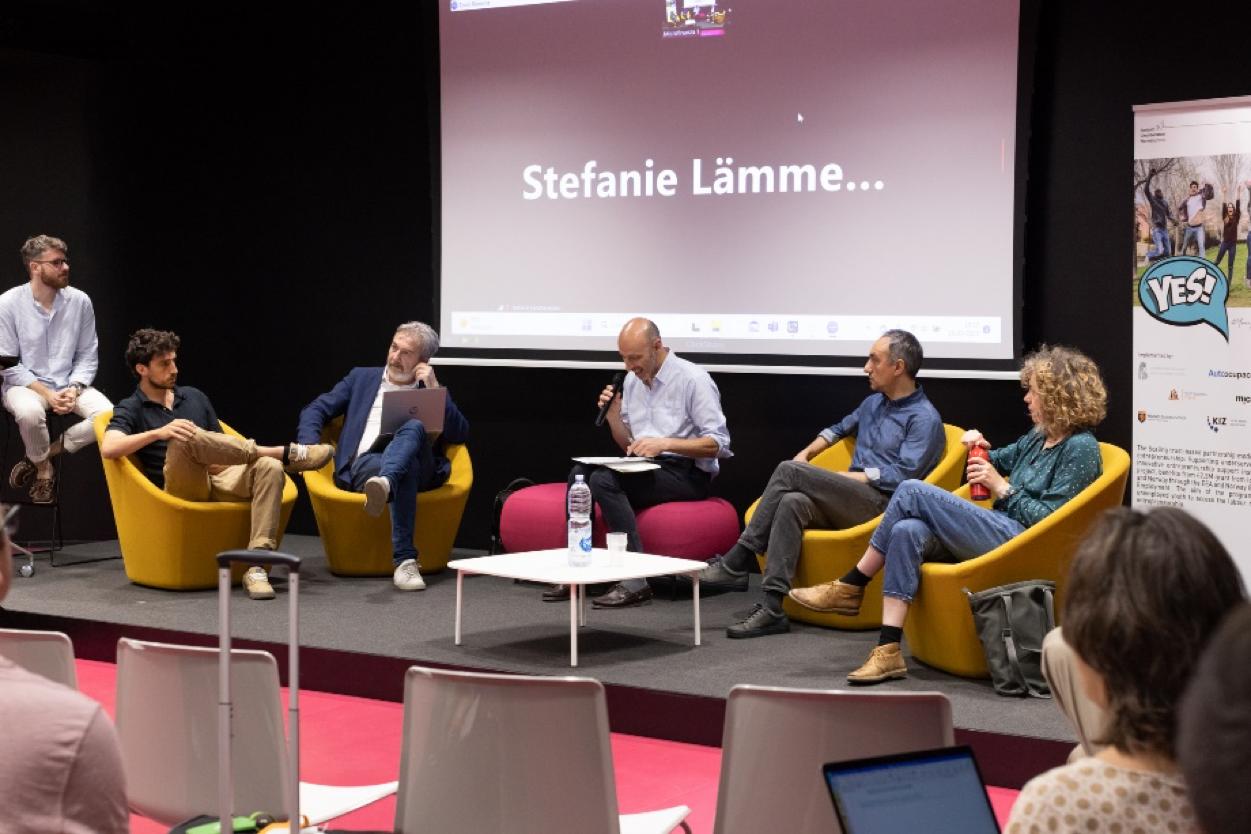
The next Workshop of the project will be in Barcelona!
YES! Project
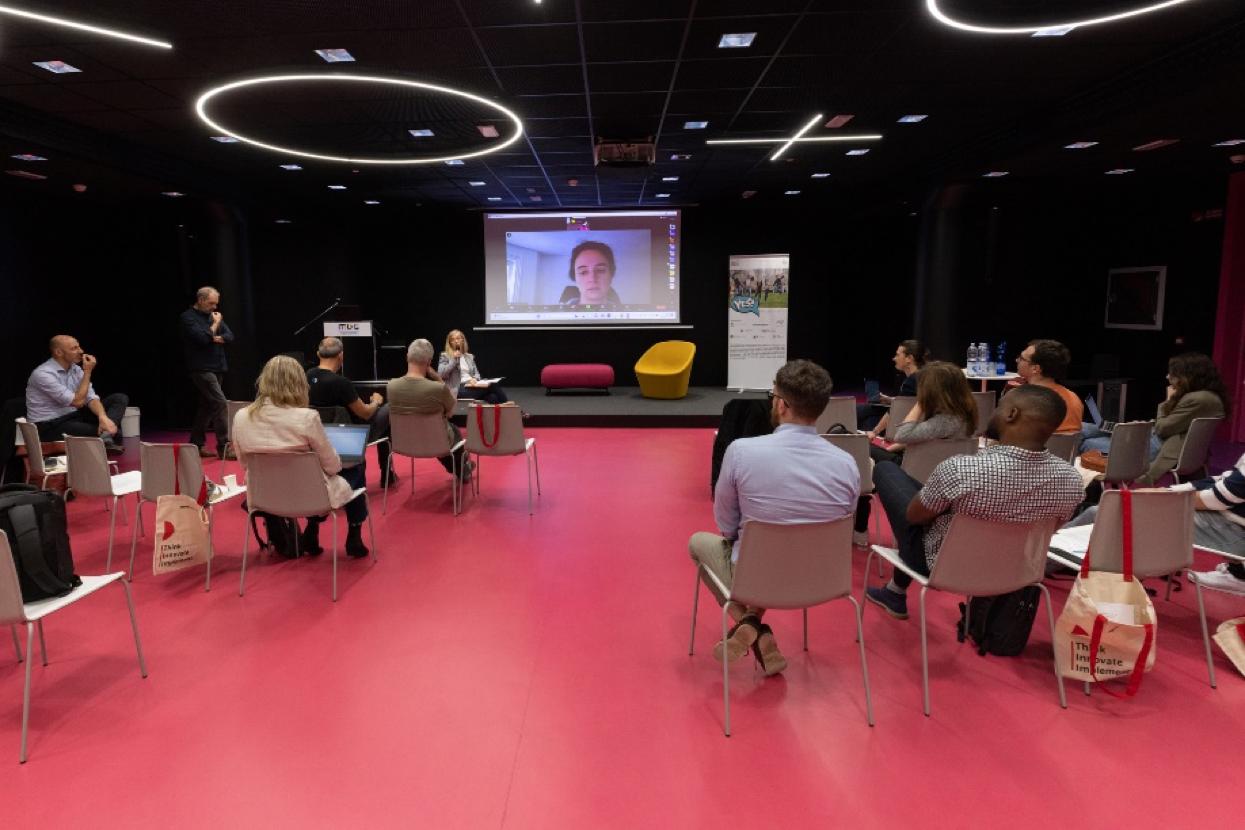
10 Regional Funds Online Magazine
Track-IN project presented their first results at the Conference ACTIVATING NEETS: CHALLENGES AND SOLUTIONS ACROSS EUROPE celebrated in Naples (Italy)
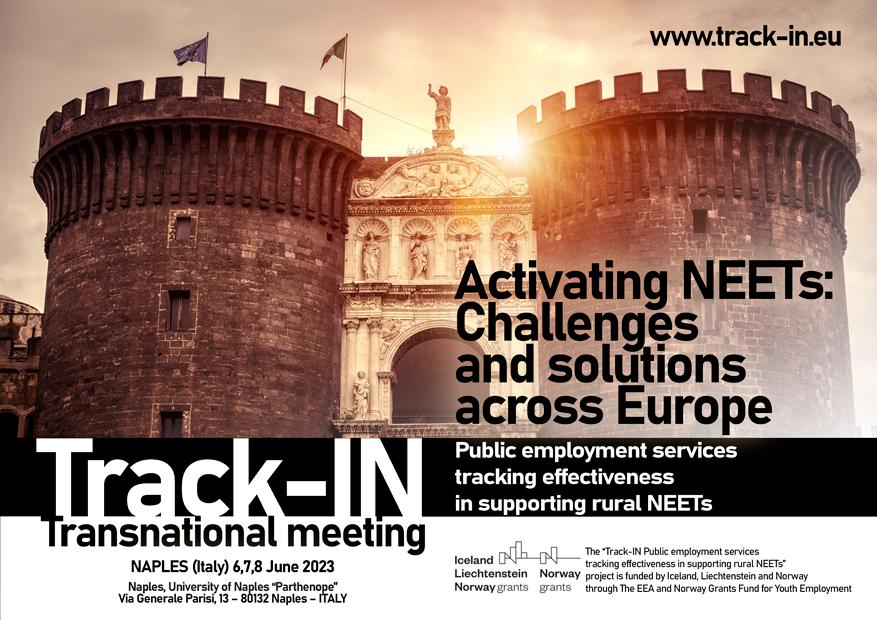
Unemployment among young people in rural areas in Europe has been a persistent concern, presenting unique challenges and implications. The rural-urban divide, limited economic opportunities, and demographic shifts have contributed to this issue.
Rural areas often face a lack of diverse industries and employment options, leading to a higher vulnerability to economic downturns. Limited access to education, training, and infrastructure further exacerbates the situation, making it difficult for young people to acquire the necessary skills and find suitable employment. As a result, many young individuals from rural areas are forced to migrate to urban centers in search of better prospects.
Across the EU member states and associated countries, the share of NEETs (Not in Employment, Education or Training) within the resident population aged 15-29, ranged in the second quarter of 2022 between 3% (Netherlands) and 4% (Iceland) to 19% (Romania) and 20% (Montenegro, North Macedonia). Estonia (16%), Italy, and Spain (14% each), as well as Bulgaria (12%), were among the EU countries that faced a higher number of youngsters not in employment education or training. Lithuania (6%) and Portugal (7%) were the only countries in our sample that had lower NEET rates in the second quarter of 2022. However, since seasonal variation may affect quarterly data, one can look at yearly reports, as Figure 2 does. In the early 2000s, several European countries initiated policies and programs to address youth unemployment in rural areas. Efforts focused on promoting entrepreneurship, providing vocational training, and enhancing access to financial resources for rural businesses. These initiatives aimed to stimulate local economies, encourage job creation, and retain young talent in rural communities.
Despite these interventions, unemployment rates remained relatively high for young people in rural areas. Many factors contributed to this, including the ongoing trend of rural depopulation, inadequate infrastructure, and the
persistent dominance of traditional agricultural practices. These challenges required sustained efforts to bridge the rural-urban gap, encourage innovation and diversification of rural economies, and ensure equitable access to education and employment opportunities for young people in rural areas.
Addressing youth unemployment in rural Europe demands comprehensive strategies that consider the unique characteristics and needs of these regions. Collaboration among policymakers, educational institutions, businesses, and community organizations is essential to create an enabling environment that fosters economic growth, encourages entrepreneurship, and supports young people in building sustainable livelihoods within their rural communities.
11
Regional Funds Online Magazine
In this sense, our project is tracking how the Public Employment Services offer an appropriate answer to rural NEETs. More specifically, we are researching three interconnected different pillars. The first Work Package (WP1) reviewed national policies based on a systematic analysis of the NEET regulations in seven EU countries (Bulgaria, Estonia, Italy, Lithuania, Portugal, Romania, and Spain), a secondary data analysis of NEETs rates on two age categories and a scoping review of academic recent literature on NEETs across Europe. The national policies analysis shows that none of the NEETs categories defined by Eurofound (2016) is systematically targeted and the most frequent groups are “other NEETs” (295 of the policy documents analyzed), which is heterogeneous by definition (including Roma youth or other ethnic minority, drug/alcohol addicts, refugees, fresh graduates, young people that left the social protection system, etc.), long-term unemployed (24% of the policy documents), respectively ill or disabled (19% of the policy documents). All other NEET groups are, overall, less frequently mentioned. The policy analysis of the documents issued since 2010 in the abovementioned seven EU countries shows that the target on youth, with no differentiation between types, is by far more common than focusing on specific groups. Only in the early-2010s moment, there is more concern with the long-term unemployed. In 2014 discouraged NEET come to attention, while interest in short-term unemployed decreased over time. The most used policy instruments at the national level are regulation and direct provision by public authorities. Financing services provided by NGOs come close, while financial support is marginal within the overall policy mix. It may be noticed the residual approach in the case of Romania, with the focus on financial transfers, especially subsidies for employers and a general lack of provision in the case of Bulgaria. In turn, Lithuania stresses active measures, financial transfers, and social services. The southern states are not as homogeneous as expected from a ‘Mediterranean’ cluster (Minas, Jacobson, Antoniou, & McMullan, 2014). Portugal’s comprehensive NEET policy champions active measures, but also financial transfers; Spain includes more financial transfers; Italy is focused predominantly on social services, but as contrasted to Romania, the state remains by far the main actor in the field.
existing academic literature, despite the higher rates of NEETs in rural areas, which reflects the lack of differentiation that one may observe in Sothern countries and at the level of the European Union. Baltic countries maintain some small distance between cities and rural areas, while Bulgaria and Romania are still marked by deep inequalities.
On the other hand, the rural-urban distinction is rarely addressed in the
The Work Package 2 (WP2) is working at ground level with stakeholders, making a mapping good good practices in supporting young NEETS in non-urban areas. For that, we are entailing several case studies taking place in rural locations of Portugal, Lithuania, Bulgaria, Estonia and Spain.
Our preliminary results show that, for example, in Portugal, the Instituto Pedro Nunes Incubator paired with the local Municipality and the PES services to launch Neetmakers, a two year programme dedicated to foster social and entrepreneurial skills in rural NEETs. And in Faro, a region marked by tourism and seasonal work, we focus a national practice of digital training courses, Jovem + Digital, launched during the pandemic in 2020.
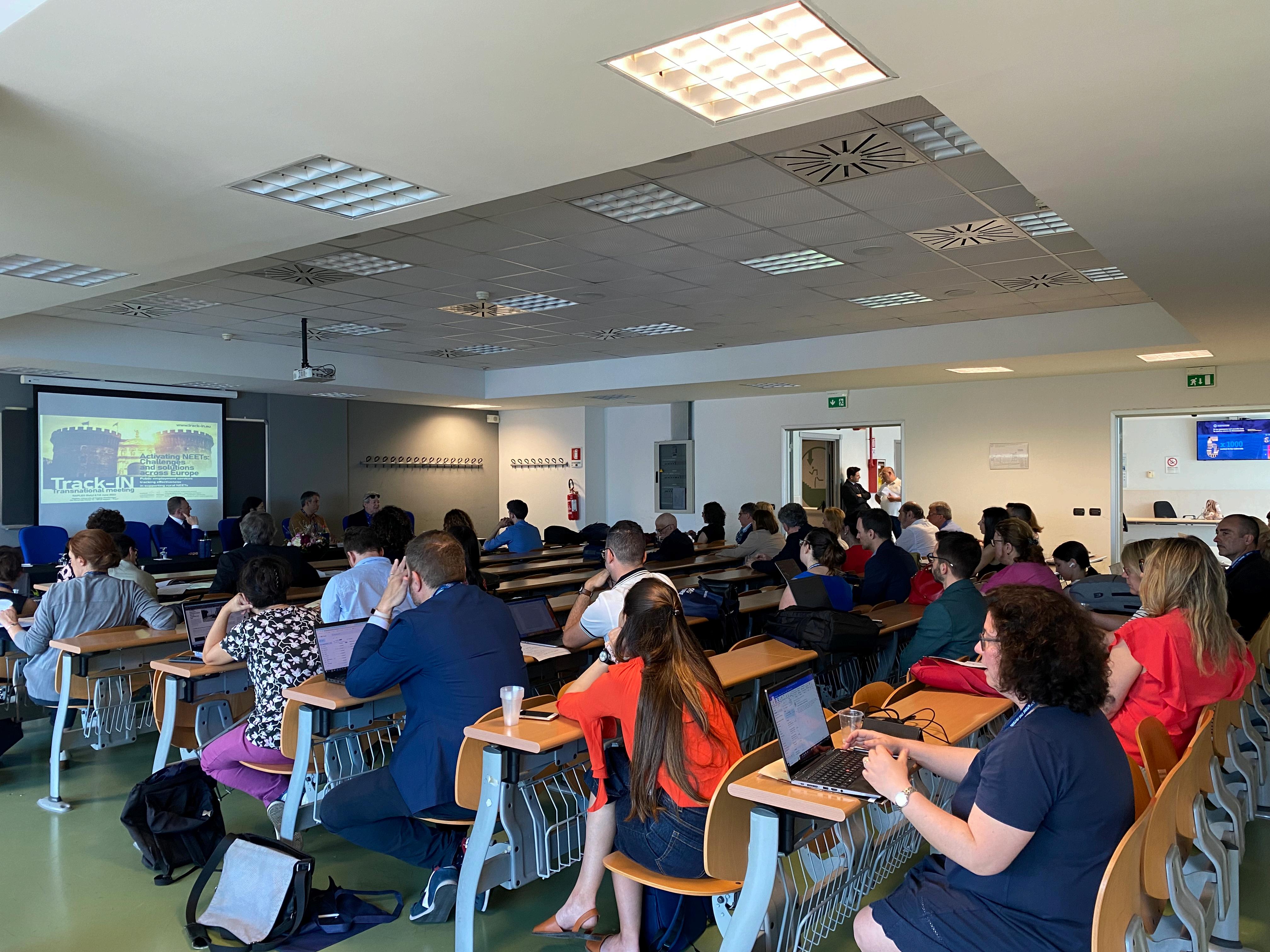
12 Regional Funds Online Magazine
In Spain, one of the case studies occurs in Pallars, Lleida in Catalonia, Spain, project called SINGULARS. Born in 2015, this project is to reinforce the employability of young people who are not employed and not integrated in the education or training systems. We will see its impact on the field and the outcomes in employability and improving skills in young people on that area.
In Bulgaria, we focused on “Mobile offices” in Blagoevgrad district, where the Employment Agency has started the active provision of the Mobile Employment Office service, which provide a full range of services to employment o ffi ces, with the aim of reducing the proportion of discouraged and inactive people, as well as helping job seekers.
In Lithuania, two cases are being studied: one at Elektrėnai, project JUDAM, with the aim to reduce the number of unemployed, uneducated, unrepresented, and not registered at the PES youth by implementing measures of activation and motivation. Another case study at Klaipeda, through Project KARJERAS, focusing professional guidance services are provided by excellent professionals in their field, who openly meet every client who visits RKC, individually assess the situation, advise and rescue them from career pitfalls.
In Estonia, three cases are being studied. “My first job”, to support recruitment and employment of people belonging to risk-group; “Minors’ employment subsidy”, to increase work opportunities for minors and to encourage the development of work habits and experiences among young people (to encourage employers to hire minors for summer jobs or part time jobs to give them work experience and develop work habit); and Career counselling, to provide aid to settle issues concerning suitable employment, career decisions and education choices.
Finally, Work Package 3 (WP3) has directly asked young people about their situation and how they see the support of the Public Employment services in Bulgaria, Estonia, Italy, Lithuania, Portugal, and Spain. This survey has two different waves, in order to compare the opinion and results of the intervention of the PES with this young population. In the first wave, implemented at the beginning of 2023, we have reached more than 2.000 valid answers from 6 countries and persons aged 25 to 29 years old. The
second wave is starting now, during June 2023 and the results will be published by the end of this year.
Conference of the Track-IN project on ACTIVATING NEETS: CHALLENGES AND SOLUTIONS ACROSS EUROPE
From the 6th to the 8th of June 2023 we organized the conference titled “Activating NEETs: Challenges and Solutions across Europe” in Naples (Italy) hosted by one of our partners, the University of Naples “Parthenope”. At this conference, we had the opportunity to discuss our first results with researchers and experts in our field.
The conference kicked-off with the intervention of one of the keynote speakers, Niall O'Higgins, Senior Research Specialist at the International Labour Organization. He talked about the gender issue and how young women's NEET unemployment rates are higher and more persistent, especially in rural areas, making scarring effects more common among female NEETs.

13 Regional Funds Online Magazine
On the other hand, he stressed the need to find new ways to categorize NEETs, mostly using new clustering methods, in order to have a better classification of cases and identify different solutions to their problems. Later, we could listen to the talk by Ruggero Cefalo, Researcher at the Department of Sociology, University of Vienna, and Editor of the Social Policy Review (Policy Press). He highlighted the importance of the role of space when we study the Rural NEETs. In his opinion, it is important to look into the subnational/regional level, as opposed to national approaches, and to do it across time to better understand youth unemployment.
Moreover, he mentioned that dedicated research should have territorial sensitivity. From the policies perspective, he urged for horizontal coordination between educational and employment policies at the regional level.
The first part of the conference finished underlining the relevance of the new EU Rural Pact and how the Youth Employment Fund can be a partner to fulfill this need. The Rural Pact is a very recent framework for cooperation among authorities and stakeholders at the European, national, regional, and local levels. It contributes to achieving the shared goals of the long-term vision for the EU’s rural areas by facilitating interaction on rural matters between public authorities, civil society, businesses, academia, and citizens.
Launched in December 2021, the Pact has been developed with other institutions, stakeholders, and members of the Rural Pact community, and the final proposal was endorsed at the Rural Pact conference on 15-16 June 2022. Elements of implementation such as the Rural Pact coordination group are still being elaborated and will come in early 2023. In the second part of the conference, we organized a round table with Italian stakeholders: - Simona Cafieri from the Italian National Statistical Institute (ISTAT); Giovanna Linfante, Responsible for the ANPAL Statistical Office (Italy); Serena Quarta, Researcher of the Salerno University and member of the Caritas (Italy); and Michele Raccuglia, Responsible for the South Area of ANPALservizi (Italy).
The Italian representatives discussed their points of view in a lively talk. The role of the Resilience and Recovery Mechanism in the inclusion of young people in the labor market; the lack of access to digital means and to the Internet and the risks of techno-optimism (how people prefer
informal contact in public encounters) and the digital divide between regions were some of the most prominent topics addressed by the invited speakers.
To finish our conference, we delivered the results up to now of the different WP of the Track-IN project. Our second round-table of the day included Elena Marta (Università Cattolica del Sacro Cuore of Milan, Italy), Co-coordinator of the Track-IN project; Claudia Petrescu (Quality of Life Research Institute, Romania), coordinator of WP1; Sofia Ribeiro (ICS – University of Lisbon, Portugal), coordinator of WP2; and Antonella Rocca (University of Naples Parthenope, Italy), coordinator of WP3.
To finish up the day, Francisco Simões (Iscte, University Institute of Lisbon, Portugal), Coordinator of the Track-IN project; and- Mariano Soler-Porta (University of Malaga, Spain) Science Communication Coordinator of the Track-IN project presented some details of the future European Rural Youth Observatory. This Observatory, which will be launched by the end of this year, aims to be a reference on all topics concerning rural young people, being a hub of knowledge and a platform for collaboration between different researchers, stakeholders, and young people, through the research, consulting, training, project development activities.
Here a short video about the conference: https://youtu.be/ykQlNAwaS6U
14 Regional Funds Online Magazine
Track-IN Project [DMS1] From the WP1 Policy brief
Digital and green transitions brought to the labour market challenges and opportunities, calling for new skills of the workforce. The European Year of Skills aims at boosting competitiveness, investment in training and upskilling opportunities to make sure that workers acquire the skills demanded on the labour market, including digital skills.
How much young people follow trainings on a regular basis? Which are the needed digital skills in our era?

The coronavirus crisis has highlighted the importance of having the right skills for strategic sectors to perform and for individuals to navigate through life and professional transitions. In particular, it has accentuated the need of digital skills in many aspects of people's daily lives and for business continuity. While telework and distance learning have become a reality for millions of people in the EU, the limitations of our current digital preparedness were often revealed. Currently, at least 85% of jobs require some level of digital ability, while only 56% of adults had at least basic digital skills in 2019. Between 2005 and 2016, 40% of new jobs were in digitally-intensive sectors. As Europe sets off on its path to recovery, the need to improve and adapt skills becomes an imperative
How can you elaborate considering your specific priority area?
15
Regional Funds Online Magazine
The European Year of Skills Presents its flagship event, the Making Skills Count Conference

The Making Skills Count Conference has been a flagship event of the European Year of Skills, that took place on 8-9 June 2023 in Brussels (and even online). The main goal was to emphasize the importance of skills development and recognition in a cross-border context and, generally, in our societies. Therefore it aimed to bring together experts, policymakers, stakeholders, and practitioners from various fields to discuss key issues and innovative approaches related to skills recognition, validation, and mobility. At the same time, the conference highlighted the importance of skills for the recovery and resilience of the European economy and society, as well as for the green and digital transitions, showcasing best practices and innovative solutions for developing, validating, and recognising skills, such as the European Skills Agenda, the European Qualifications Framework, the Europass platform, and the European Skills Panorama. We believe that, reading this summary, you will find topics and points very similar to the main theme of our Mag.
The different sessions, workshops and discussions focused mainly on topics such as unlocking skills, recognising qualifications, promoting lifelong learning, and addressing the challenges and opportunities of skills development in a rapidly evolving economy – making then a real link to the EEA & Norway Grants goals and challenges to face. As we do daily, it was an occasion to explore best practices, policies, and initiatives aimed at enhancing skills mobility, bridging the skills gap, and promoting inclusive and sustainable growth across European countries.
Not surprisingly, the Making Skills Count Conference saw the participation of representatives from government bodies, educational institutions, industry associations, and other relevant organisations. The ideal results was to provide for a platform for knowledge sharing, networking, and collaboration, with the goal of advancing skills development, recognition, and utilization to meet the demands of the modern labor market. Basically what we are going to discuss with that Mag’s edition, isn’t it?
Indeed, such as we are presenting in this issue, the conference aimed to explore different ways in which skills “count” and matter for individuals, employers, and society, showcased initiatives and tools addressing skills-related challenges. The covered topics seems to perfectly fit with our topic of the month:
• Skills-first approaches for recruitment and talent management;
• Skills for the green and digital transition and for net-zero industry;
• Skills for social inclusion and active citizenship;
• Skills development and lifelong learning, etc.
16
Regional Funds Online Magazine
With other terms, participants explored a variety of ways in which skills count and matter, to individuals, organisations, and at system level. Such as you do.
Bringing together stakeholders, training providers, guidance and validation practitioners, companies, social partners, chambers of commerce, qualifications agencies/authorities, and public authorities who play a vital role in the concrete delivery of skills, a concrete occasion was created to stimulate discussion about the gaps in skills development and the needed changes in public policy and in the business world, with a view to improve implementation and reforms.
The event resulted in some lessons learned on how to address skill imbalances, also by taking advantage of EU initiative and tools. What we, as Regional Funds, are doing following a similar path, is fostering dialogue and cooperation among different actors and sectors involved in skills development and use, and trying to make skills count for all, by ensuring that everyone has access to quality and inclusive education and training, that skills are recognised and valued across borders and sectors, and that skills intelligence and guidance support informed choices and career development
Meaning that, most probably, this is the right path.
Francesca Bombarda
17
Regional Funds Online Magazine
A best practice implemented by Microsoft in Greece The digital skills demanded by the new labour market
In recent years, workers and businesses have faced a new reality. The labor market is constantly changing, at a rapid pace and in line with the evolution of technology. As a society, we are called upon to adapt to this new era by moving to a model of continuous education, acquisition and upgrading of new skills, professional mobility, and transition to new careers.
In this context, striving for new digital skills has double importance. On the one hand, it creates new opportunities for employees and unemployed people to develop professionally and improve their quality of life, and on the other hand, it responds to the market's need to fill positions that require active use of new digital tools and technologies.
Digital skills are a key pillar of Microsoft's GrforGrowth investment initiative that supports Greece in its digital transition and creates new growth opportunities. The company's emphasis on digital skills is the following: According to Microsoft's Digital Futures Index, which reveals correlations between digitalization and economic and social benefits, people living in countries with higher levels of digital skills and active use of digital technology are more productive, earn more, produce more innovation, and have better quality of life.
In the context of GrforGrowth, Microsoft has set an extremely ambitious goal for Greece: To provide 100,000 digital skills trainings by 2025 in collaboration with institutions and organizations. Already, today, more than 40,000 people have benefited, among them 10,000 young graduates, 5,000 executives and employees of the public administration and 1,000 unemployed.
Microsoft digital trainings are not only for people who are at the peak of their business and professional lives, but are provided to everyone, according to their needs.
For example, the DiGiYouth Initiative, a partnership between Microsoft and ReGeneration, offers unique education and employment opportunities for young graduates, with the aim of reducing youth unemployment. The program focuses on learning and developing highly sought-after digital skills (up/reskilling) and has been created to substantially help participants in their professional steps, placing them later in key positions in the labor market.
The programs are accessible to young people from all over the countrythe academies that have already been completed include, among others, beneficiaries from Drama, Crete, Rhodes, Serres, Patras and Thessaloniki. This is an initiative addressed to every corner of mainland and island of Greece.
All graduates – 100% – from DiGiYouth Academies such as "ReGeneration Academy 4 Women in Tech" and "ReGeneration Academy on Cloud Tools & Technology", have already found work and now fill organic positions in small and large businesses throughout Greece.
Digital skills bring more women to tech
GrforGrowth's main goal is to help more women work in the technology sector. After all, women appear ready to meet this challenge, as long as the right opportunities are available. A typical example is the extremely high participation of women in different skills learning programs supported by Microsoft: 54% of the beneficiaries of the Program implemented in collaboration with Labor Office, aiming at the reintegration of unemployed into the labor market, were women. More than 640 women - young university graduates - benefited from the digital training programs implemented in the framework of GrforGrowth, in collaboration with ReGeneration.
18
Regional Funds Online Magazine
In the above two programs, as well as in many other similar free training programs that Microsoft offers through GrforGrowth, no programming knowledge is required. However, participation in them increases the possibilities and opportunities for a woman to claim jobs in a market that is "thirsty" for specific specializations.
Digital skills are also essential for sustainable development
Green digital skills are becoming increasingly essential for the transition of businesses to a more sustainable future, in every sector of the economy. However, there is a serious shortage of such skills in the labour market. According to the LinkedIn Green Jobs report, while green jobs grew at an annual rate of 8% between 2015 and 2021, the corresponding talent pool grew by only 6%.
These training programs equip beneficiaries with know-how to create sustainable digital solutions and in particular for sustainable design strategies, creating more environmentally friendly services, solutions and products and exploiting digital data, in order to reduce the negative footprint on the environment.
*Source: CNN Greece
Microsoft, recognizing that technology and digital skills are a valuable tool for sustainable development, now offers free training and certification in "Green Skills" in Greek as well.

Training and certification are available to everyone through the Microsoft Sustainability Learning Centre, LinkedIn and Inco Academy and are an ideal opportunity for both new graduates and SMEs aiming to upskill their employees.

19
Regional Funds Online Magazine
SEPAL Project
Learning digital skills: insufficient opportunities or reluctance?
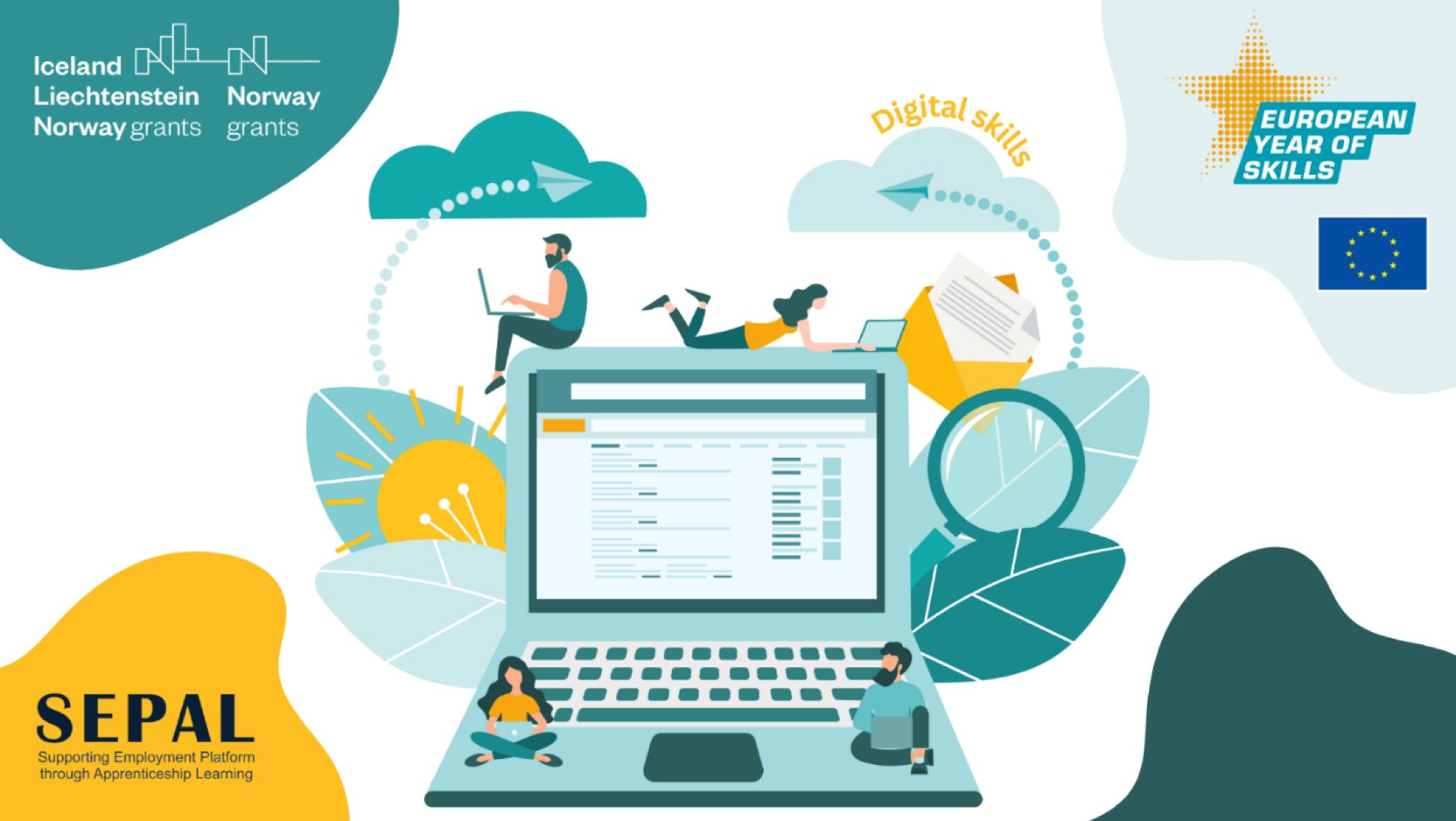
employees seem to face difficulties in acknowledging these new abilities. The 2021 Eurobarometer shows that about 1 in 4 citizens are worried about this issue, which could negatively impact some of their activities, such as working or studying online. With regard to the same topic, it has been discovered that 23% of people aged 15-24 years old are concerned about their capability to learn digital skills, and this percent increases by age, with 26% for those over 55.
More than two decades ago, little did we know how digital technologies were about to change our lives forever. Virtual posting, sharing, liking and commenting are the result of a continuously developing Web, which allows us to be close even from distance and transpose our feelings via online means. Today, thanks to all these functionalities, we are more connected than ever, both from a personal and professional point of view. It is no surprise that in recent years, especially since COVID-19, digital and green transitions have been accelerated, stimulating even traditional companies to embark on a virtual path. The use of social media is maximizing year by year and as a consequence, users’ high consumption of Internet has become an open door for businesses to advertise their products and services online.
This phenomenon has led to an increased demand of professionals specialized in the digital field, which, according to Eurostat, consists of five areas: information and data literacy skills, communication and collaboration skills, digital content creation skills, safety skills and problem-solving skills. Having o adapt to a new labour environment,
Perhaps the most challenging skill is digital content creation, which requires social media managers to keep up with the latest trends and continuously innovate. In order to create engaging content, specialists need to become familiar with many tools and aspects: video and photo editing softwares, graphic design programs, display algorithms and digital media law. But once the content is created and ready to be published, an even extended level of knowledge has to be put into practice. SEO or Search Engine Optimization strategies are essential for you business, in order to return your services among the first search results. Advertising models and indicators such as PPC (pay-per-click) or PPV (pay-per-view) need to be measured to assess your succes, and e-mail marketing campaigns should be launched to spread the word about your products or services. At just one quick glance, the various areas of digital skills provide enough options to choose from.
However, many employees and recent graduates struggle to adapt to this new environment, as university programs in many European countries are not prepared themselves to train future professionals in this field. In 2021, statistics show that Romania (28%), Bulgaria (31%) and Poland (43%) were among the countries with the lowest share of people having at least basic digital skills, compared to The Netherlands and Finland (79%). Sill in 2021, researchers have discovered that only about 10,8% of EU citizens aged 25 to 64 had participated in education or training in the last 4 weeks, which may indicate a reluctance or fear to engage in new learning activities.
20
Regional Funds Online Magazine
As a best practice example, until 2025, Microsoft and LinkedIn intend to help over 10 million people gain the necessary digital skills to fill in the new gap in the economic sector, by providing free access to over 350 courses and 50.000 learning scholarships. With the same intention, in the European Year of Skills, NGOs and institutions all around Europe have started to launch project ideas and access grants to fund digital skills learning activities, especially for people coming from vulnerable backgrounds. At the end of the day, it also lays in one’s power and ambition to find the right opportunities to become better trained for a specific profession. In 2023, according to the European Commission’s view, there will be great investments in upskilling and reskilling, with focus on lifelong learning, relevance of the trainings to cover current needs and match people’s best abilities with suitable jobs and opportunities.
Resources:
• Microsoft
• Eurostat
• Digital Skills & Jobs Platform SEPAL Project
21
Regional Funds Online Magazine
Developing digital powers: How youth are conquering the world of digital skills
• Technological competency- understanding of basic concepts and technological tools, such as computer operation, use of the Internet, ability to search for information online, operation of office programs, etc.
• Electronic communication- the ability to use various forms of electronic communication, such as e-mail, instant messaging, social media, etc. Proper online communication is extremely important in both personal and professional spheres.
• Digital security- knowledge of the principles of safe internet use, protecting privacy, avoiding online threats, recognizing phishing, managing passwords, etc. The ability to recognize digital threats is essential to protect one's data and use technology safely.
Beata Mintus SEPAL Project
The number of young people regularly participating in training in Poland is steadily increasing in the digital age. Realizing the increasing role of technology in our daily lives, young people are increasingly interested in expanding their digital skills. Schools, NGOs and companies alike are offering a variety of training courses to prepare young people to function effectively in today's digital world.
According to various studies and statistics, a significant number of young people in Poland participate in digital skills training. The growing interest in digital training among young people is noticeable.
Digital skills are extremely important nowadays. Technology is everywhere, both in the personal and professional spheres. Having a solid foundation in digital skills is becoming crucial to be able to effectively navigate today's information society. Here are some important digital skills to develop in our era:

22
Regional Funds Online Magazine
Bridging the Digital Skills Gap for Youth Employment: Experiences of Project SEPAL

Young people's employability is hampered and their career options are constrained by the disparity between well-developed basic communication technology abilities and poor work-related ICT skills. But the growing significance of digital skills offers young people a special chance to improve their competitiveness in the employment market.
The Need for Work-Related ICT Skills
Work-related ICT skills are crucial for young job seekers to meet the demands of a digitalized labour market. These skills encompass a wide range of competencies, including programming, data analysis, cybersecurity, digital marketing, artificial intelligence, and more. Embracing these skills equips young individuals with the tools necessary to adapt, innovate, and contribute effectively to various industries.
Digital skills are becoming more crucial than ever in the ever-changing labour economy of today. The demand for work-related ICT skills is on the rise as the globe makes the transition to a digital and green economy, which both opportunities and challenges for young job searchers. Initiatives like Project SEPAL are coming up in response to this need to close the digital skills gap and provide young people the abilities they need to succeed in the digital age.
The digital revolution is causing a substantial shift in the work sector. While young people now often use cell phones and social media, there is still a lack of ICT skills that are relevant to the workplace. Many young people lack the knowledge necessary to operate more sophisticated technology and software programs that are frequently employed in professional settings.
Digital skills are not only essential for securing employment but also for career advancement. The ability to leverage technology to solve problems, communicate efficiently, and analyse data is highly valued by employers across sectors. By acquiring work-related ICT skills, young people position themselves as competent and adaptable professionals, increasing their chances of career success.
The project SEPAL recognizes the importance of providing accessible and targeted education and training opportunities to young individuals. Through partnerships with educational institutions, industry experts, and government entities, project SEPAL team is developing and providing tailored courses, workshops, and resources that cover key work-related ICT skills.
23
Regional Funds Online Magazine
Digital Skills and Career Journeys
Project SEPAL is helping young people find employment and giving them the tools they need to realize their full potential in the digital era. Young job searchers can adapt to the changing needs of the labour market, boost their competitiveness, and find high-quality employment possibilities by developing key work-related ICT skills.
Additionally, the advantages go beyond personal achievement. Teaching young people digital skills helps economies expand and remain competitive overall because workers with these abilities encourage innovation and progress technology across a range of industries. This then results in the overall economic development of the nation.

Young job searchers must develop work-related ICT skills in order to succeed in the labour market in this era of digital revolution. Young people may take advantage of the opportunities offered by the digital economy and help to build a prosperous future by embracing digital skills.
It is essential for young people to appreciate the value of digital skills and actively seek out opportunities to advance them when they begin their professional careers. The full potential of the digital age may be unlocked by individuals and societies through investments in digital education and training, ensuring a better and more affluent future for the young workforce.
24
Regional Funds Online Magazine
SEPAL Project
Acquiring Skills in the Digital and Green Transitions Era: Empowering NEETs for the Labor Market
The digital and green transitions have significantly reshaped the labor market, presenting both challenges and opportunities. As technological advancements and sustainability imperatives gain prominence, the demand for new skills has surged. Recognizing this need, the European Year of Skills aims to enhance competitiveness, promote investment in training, and provide upskilling opportunities to ensure that workers acquire the skills demanded in the labor market, particularly digital skills.
However, a specific focus must be given to NEETs (Not in Education, Employment, or Training), who face unique obstacles in skill acquisition. Helping young people who are not currently engaged in any form of education, employment, or training and at the same time face mental health problems that hinders their opportunity to successfully integrate into the labor market is particularly important both for their personal and professional development and for society. Depending on the type and extent of the mental problem young unemployed people have deficits that for objective reasons cannot be avoided, and this often creates serious barriers when it comes to their personal realization and social integration. This is why mental health professionals and mentors at the Youth House "Hidden Likes" and the L.I.K.E Project have focused their attention and efforts on working with
NEETs, aiming to strengthen their social inclusion by addressing the skills gap and providing them with opportunities to acquire the skills needed for the labor market. In this article, we are aiming to share our best practices and initiatives that have proved over time to successfully empower NEETs in acquiring the skills required for success in the digital and green transition era.
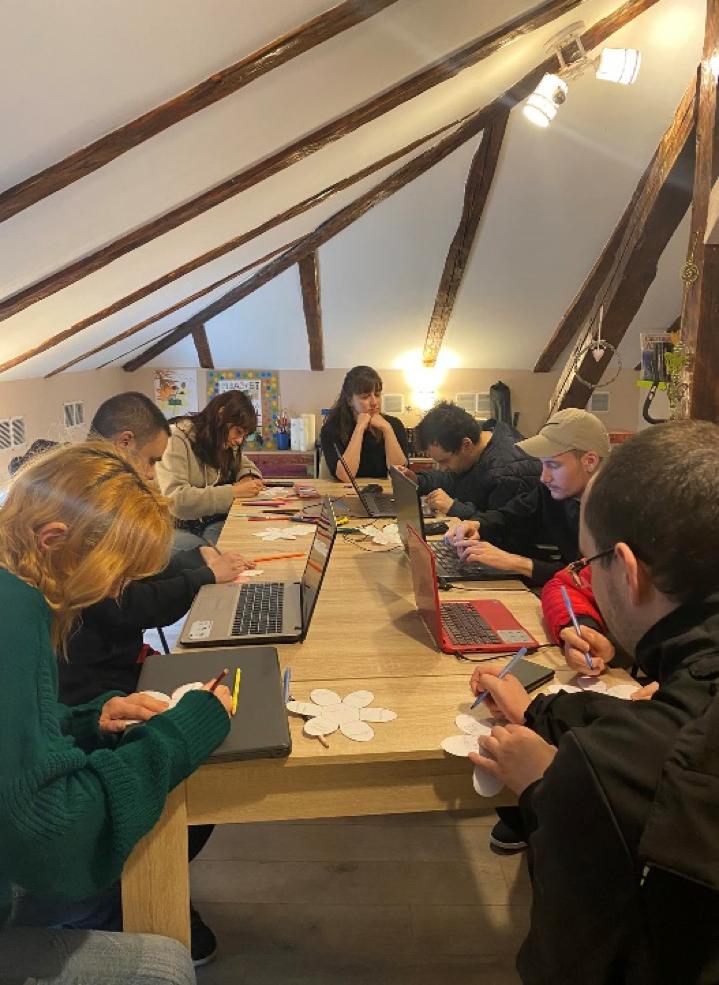
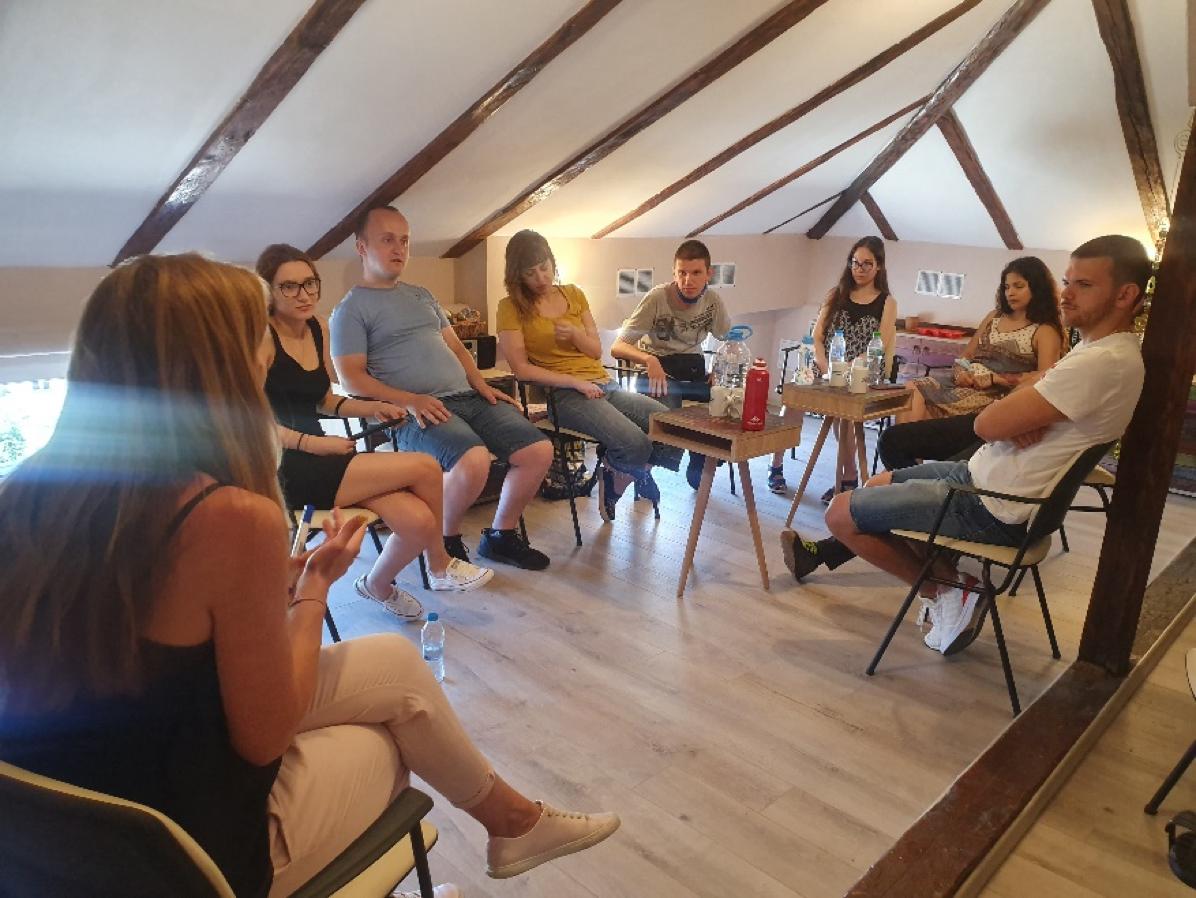
Tailored Skills Development Program:
The multidimensional model L.I.K.E that is being implemented in the "Hidden Likes" Youth House has been specifically tailored to the requirements and needs of NEETs. It has been designed to provide and o ff er unemployed young people with mental health problems, not only medical, social and psychological rehabilitation but also professional and labor rehabilitation. Thus, this approach focuses on equipping NEETs with both digital and green skills via incorporating practical pieces of training with a view to enhancing their employability. By aligning the program with emerging job trends in digitalization and sustainability, NEETs can acquire the necessary competencies for employment in these growing sectors.
25
Regional Funds Online Magazine
Comprehensive Career Guidance:
NEETs often face challenges in understanding their career options and navigating the labor market. This is why comprehensive career guidance is being provided to these unemployed young people with mental health problems in the "Hidden Likes" Youth House aiming to support them in identifying their strengths, interests, and potential career paths. Dedicated mentors are providing NEETs with career counselling workshops, individual sessions and personalized guidance that fully meets their individual needs. The model of the "Hidden Likes" Youth House has created sustainable coordination between concerned institutions thus making it possible to regularly offer information on training opportunities and further education options and possibilities.
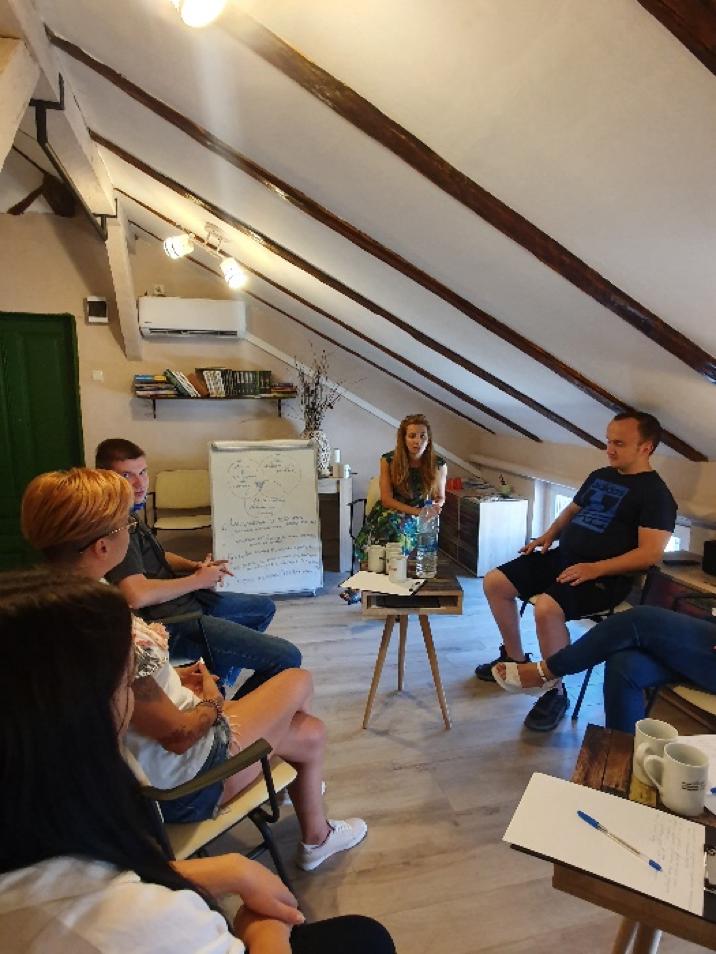
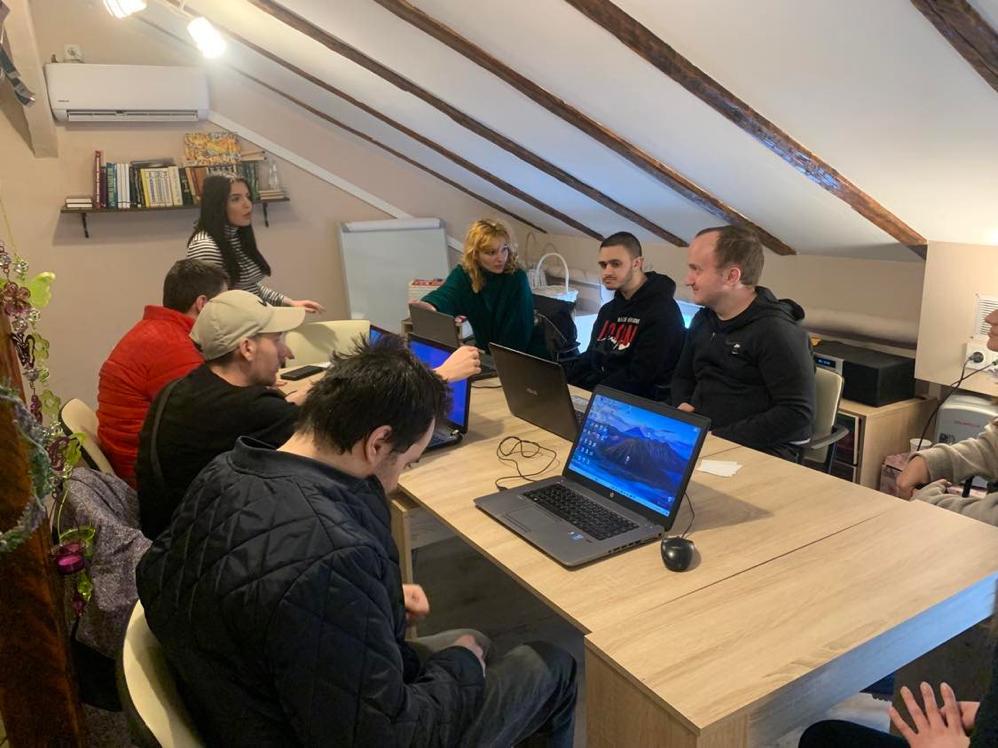
Partnerships with Employers:
Collaboration with employers is essential to ensure the relevance and effectiveness of skill acquisition activities in the "Hidden Likes" Youth House. This is why experts from the Youth House are maintaining the coordination between the implemented activities and employers who are regularly being invited to share their thoughts and professional view regarding the design and delivery of training materials and activities. This has proved to allow the alignment of skills with industry needs. Such collaborations foster a better understanding of labor market demands and increase the chances of successful employment outcomes for NEETs. The digital and green transitions have reshaped the labor market, creating new challenges and opportunities. To empower NEETs and ensure their inclusion in the workforce, targeted strategies and initiatives are being implemented in the "Hidden Likes" Youth House. Enhancing access to education and training, tailoring skills development programs, providing comprehensive career guidance, offering digital skills initiatives, and fostering partnerships with employers are key steps towards enabling NEETs to acquire the skills demanded in the labor market.
L.I.K.E. Project
Digital Skills Initiatives:
Given the significance of digital skills in today's labor market, targeted activities focusing on enhancing digital literacy among NEETs are currently being implemented in the "Hidden Likes" Youth House. This involves providing access to computers, online learning platforms, and workshops. By o ff ering these resources, NEETs can develop essential digital competencies enabling them to thrive in the digital transition era.
26
Regional Funds Online Magazine
The new needs in eco-sustainable and digital professions. How the labour market face the new skill challenges
Eco-sustainability and digitalization are key drivers of labor market transformation, with European investment supporting their prominence in recruitment plans. The demand for jobs in the next five years is estimated to be between 3.5 and 3.9 million, with a significant need for digital and green skills. Specific roles such as Data Scientist, Cyber Security Expert, Digital-Specialized Business Manager, Environmental Lawyer, and Organic Product Certifier are in high demand.
The digital transition, green transition, and demographic transition will have profound effects on employment structures. The impact of the digital revolution will depend on technology's ability to replace routine jobs while creating demand for highly skilled professions. The 4.0 work environment requires e-skills across various fields to leverage technologies.
The commitment to the green transition and renewable technologies will create employment opportunities. Demographic processes, including longer lifespans and the "silver economy," will change the age composition of the workforce and consumer patterns. Skills enhancement, training, and inclusion initiatives are needed for older workers and immigrants.
Investments and reforms should focus on digital skills, vocational education, apprenticeships, and inclusivity for women and young people entering the labor market. The transition to sustainability will have pervasive effects on the economy and society, creating new opportunities in renewable technologies and sustainable products/services while impacting sectors with high emissions and resource exploitation.
Over 42% of the demand for green skills requires highly specialized occupations, including engineers, construction site management technicians, occupational safety technicians, architects, land reclamation specialists, craftsmen, and workers in construction finishing. The push for green transition also requires skills across sectors, such as environmental
lawyers, green accounting specialists, green investment fund experts, salespeople promoting sustainable materials, and green purchasing managers.
Digital transformation involves advances in technologies like AI, IoT, robotics, 3D printing, and Blockchain, as well as new materials and processes. The estimated demand for digital skills between 2021-2025 is around 2 million to 2.1 million employees, accounting for about 57% of the total demand. This affects both existing and emerging occupations, including data scientists, big data analysts, cloud computing experts, cybersecurity experts, business intelligence analysts, and AI system engineers. The growth in demand also reflects the acceleration of digital and process automation and the need for cybersecurity specialists.
Regione Siciliana
StayOn Project
27
Regional Funds Online Magazine
The new digital world around the corner: Transition in the labor market
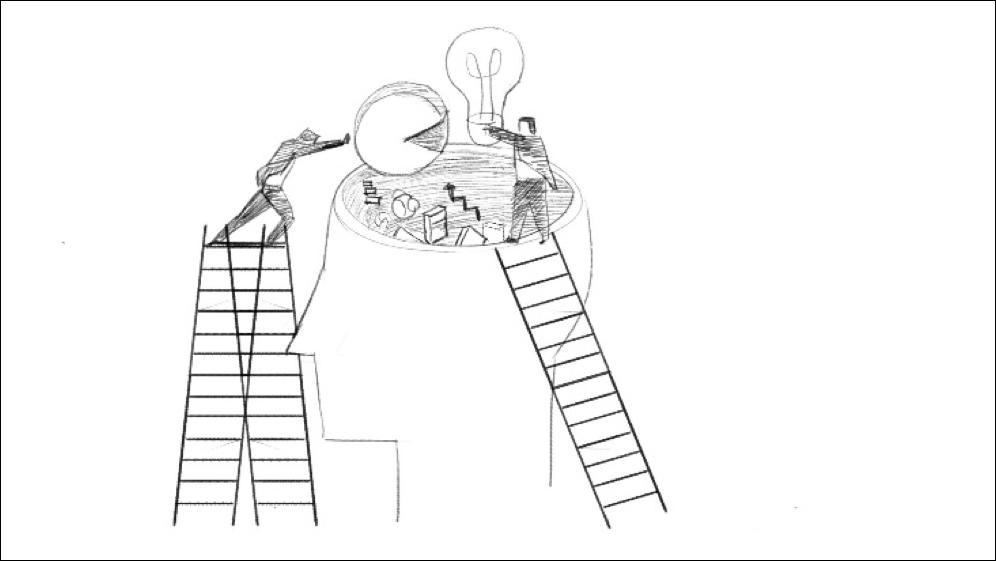
Humanoid robots, autonomous vehicles, green AIs, programming, web development, simulation tools, gamification in smart offices to foster energy efficiency, and many other digital and green transitions worldwide are snowballing. What does all this progress mean for the new generation surrounded by technology and entering the business world and labor market? And what does it mean for the currently working community? Knotty questions! Significant challenges and opportunities arise as the digital era contributes to a changing world of work. The lack of clarity in the transition process may cause obstacles during the implementation, and the abundance of unprecedented opportunities that arise may need to be adequately managed. The digital skills required in the workplace are more advanced, and companies expect most of their employees to have or gain them since the labor market is one of the most competitive of all time.
Transitioning to an unfamiliar system can cause demotivation and uncertainty, a considerable barrier to surmounting skill gaps among employees. Initially, self-confidence should be instilled in all workers to face the state-of-the-art challenge of digitalization. We must assure all employees that they can keep up with the digitalization that evolves every hour by staying restrained and courageous, that adequate training will be provided for this, and professionals can access guidance quickly in cases where difficulties are encountered. It is imperative to ensure that individuals of all ages, genders, cultures, socioeconomic backgrounds, and geographical locations have access to goods and services involving digitalization. Training must be continuous, methodological, encouraging, and comprehensive.
Social media is one of the main elements of our daily lives and it has become the place where almost everyone shares their successes, projects, published papers, and newly signed contracts. As a consequence, competition has grown among job-seekers and workers.
Social sharing has both unfavorable and favorable effects. On the one hand, social media facilitates sharing content and labor market participation and increases the probability of finding a job. On the other hand, it can also lead to feelings of anxiety, insecurity, and inadequacy in those working in a shared, cumulative environment. In order to reverse these negative fallouts, a healthy competition concept in the workplace should be conceived, improving demanded digital skills. Competitiveness is not the new kid on the block; however, it is worth considering the emergent changes in the competitive landscape that the digital economy may bring about.
www.stay-on.eu
IG: @stayon_project
FB: @stayonproject21
28
Mine Tülü European Center for Social Finance StayOn Project
Regional Funds Online Magazine
The European Year of Skills falls on the current time for us, i.e. 2023.
During this period, the assumptions of the European Union are being implemented, increasing the intensity of activities to improve the skills of employees. Thanks to this, skilled workers and the companies in which they work will be able to contribute to the ecological and digital transformation, while supporting innovation and competitiveness.
What are the ecological and digital transformations?
The reality that surrounds us has a significant impact on our lives, in every aspect of it. Broadly understood environmental problems related to human impact on the environment and, as a result, climate change, force us to adapt to the current reality. At the same time, technological development triggers and drives our enormous human progress. We develop and use artificial intelligence for more modern startups that facilitate our everyday life. The Green Deal and digital transformation, i.e. the two pillars of the EC policy, go hand in hand. It is stated that environmental protection is not possible without new technological applications, and digital technologies, in turn, are important to achieve the goals of sustainable development. To achieve this, they should strive to achieve climate neutrality. In this whole eco-digital arrangement, it is extremely important for us that it has a large impact on our ... work! The labor market is changing because technological development is progressing and environmental problems need specific human decisions and actions. This forces us to create new professions and change the qualifications of employees by increasing the intensity of activities in the area of their professional education.
What digital skills are needed today?
We have noticed a rapid pace of technological development in the last 20-25 years. Today, work is completely dominated by technology, the Internet and digital solutions, in every industry and in every position. Digital skills are becoming the skills necessary to perform professional work. New opportunities that computers and technologies give us affect the creation of new professions.
Employers are looking for qualified employees who will understand the need to use the digital world, will find themselves in the digital reality and will be willing to develop in this direction.
Valuable and needed employees should have digital skills and competences related to the use of data and information, communication and cooperation, digital content creation, programming and cybersecurity.
The young generation versus sustainable development as well as ecological and digital technologies.
There is a clear trend among young people to pursue education. Statistical data indicate that in 2021 in Poland, 147,760 women and 125,659 men took the matriculation exam (a total of 273,419 people). In the same year, 297,368 young people graduated from higher education. According to a Deloitte study from 2021, representatives of Generation Z, to a greater extent than the older generation Y, are concerned about climate change and its impact on the planet and our daily lives.
29
Regional Funds Online Magazine
Digital and green transitions brought to the labour market challenges and opportunities, calling for new skills of the workforce. The European Year of Skills aims at boosting competitiveness, investment in training and upskilling opportunities to make sure that workers acquire the skills demanded on the labour market, including digital skills. How much young people follow trainings on a regular basis? Which are the needed digital skills in our era?
They identified the climate crisis as the biggest current problem, more important than unemployment and healthcare. They try to fight climate change, and in the workplace they pay attention to the implementation of solutions beneficial for the planet by their superiors. In addition, digital reality is a place where they find themselves perfectly. By gaining many educated representatives of this young generation every year, it is worth realizing that they constitute a huge potential for future entrepreneurs who can implement ecological and digital technologies, striving to achieve the assumptions of sustainable development.
Entrepreneurs and the implementation of ecological and digital technologies.
Both representatives of the Z generation and every responsible entrepreneur can contribute to the care of the environment and the quality of our life by using digital technologies. Positive impact startups that combine technology with social good are a fitting example of this. Every year, entrepreneurs turn their bold ideas into reality by establishing companies based on new technologies that improve our everyday life while taking care of the planet. Examples include:
The start-up PhiLabs SA uses innovative solutions in pediatric physiotherapy using a device called Phibox. It contains therapeutic exercises that, together with a set of mini-games controlled by the child's motion, motivate them to exercise regularly. Regular exercises that the child willingly performs improve posture defects.
Another startup, Foodsi, pays particular attention to reducing food waste.
By using the Foodsi application, you can buy (at prices with a discount of at least 50%!), fresh food from nearby restaurants, bakeries and shops. Thanks to this, the purchased food, as unsold production surplus, will be consumed and will not end up in the trash!
challenges of the future. Educate teachers who will have the appropriate qualifications to prepare students for the technological revolution. Educated students, on the other hand, each year will be the next link in the chain of entrepreneurs implementing new technologies.
Educating young people who open their businesses and think innovatively by combining technology with ecology is extremely important. Entrepreneurs can receive support in business education determining how to develop their startup in order to succeed on the market with the help of various foundations. An example is the Youth Business Poland Foundation, which, by implementing assistance programs for young entrepreneurs, such as Young Entrepreneurs Succeed! supports them in the implementation of innovative ideas and in being competitive on the market.
Let's consider what trends in 2023 are conducive to the development of companies? Young, novice entrepreneurs should prepare for the implementation of digital transformations by e.g. investing in automation, regular adaptation to the current market and customer requirements, investing in the concept of total experience (digital employee and customer experience), using enterprise intelligence (integration of systems that allows the use of data and building a company's market advantage), care for digital security and which is crucial for us, running a business based on the assumptions of sustainable development.
YES! Project
What will the future bring us?
It is assumed that in the education system it is necessary to carry out a digital evolution through slow implementation of changes adapting it to the
30
Regional Funds Online Magazine
Today’s economy is experiencing profound transformation driven by the digital revolution and the green transition. The two phenomena have been termed the “twin transition” (EC, 2020). Like every other twin, they can advance each other and can also clash. While one aims to adopt the latest technological advancements to the workplace by reshaping industries and work processes, the other advocates for the promotion of sustainability and reduction of carbon emissions as a way to address environmental issues.
As advancements in digitization get better by the day, there is an ongoing fear that it will result in massive job loss. The world economic forum estimates about 85 million jobs will be lost due to the digital automation of work processes by 2025. While this has generated a lot of skepticism among workers, especially the aged ones, the process is expected to create additional 95 million new jobs in the same period. Apart from the opportunities that come with the digital and green transition which includes job creation, investments in innovation and the green economy, expansion of digital jobs, etc, it also poses several challenges including job loss, skills mismatch and labor shortages, technological divide, and access, inequality and social exclusion, to name a few.
As the digital and green transitions drive changes in the labor market, which includes the creation of new jobs and upgrades to the old ones, workers and organizations must adjust accordingly by investing in training, re-skilling and upskilling, change in attitude to work, to name a few in other to actualize the potentials of these transitions and to avert the issues of unemployment.
Nonetheless, since young people have good knowledge of digital technology, it is expected that these transitions will benefit them the most. For example, every young person (16 – 24 years old) in the EU has basic or above basic digital skills. Countries like Iceland, Norway Switzerland, Croatia, Netherlands Estonia, Greece, Czech Republic, and Lithuania have a higher rate of digital skill (above 90%).

31
Figure 1. Share of young people with basic or above digital skills in 2019
Source: Eurostat
Regional Funds Online Magazine
Digital and green transitions brought to the labor market challenges and opportunities, calling for new skills of the workforce. The European Year of Skills aims at boosting competitiveness, investment in training and upskilling opportunities to make sure that workers acquire the skills demanded on the labor market, including digital skills. How much young people follow trainings on a regular basis? Which are the needed digital skills in our era?
For digital and green transitions to be successful, it is not enough to have basic digital skills. Investment in training, devoting time, and commitment are required to learn and gain new skills. This will ensure the younger generation is not left out of the digital revolution and green transition. This will also reduce unemployment and social inequality challenges that may arise due to the transformation.
Considering the digital revolution and green transitions, one question that comes to mind is the digital skills needed to penetrate the market. While hard skills are sought after in the market, employers are also looking for workers with more soft skills to complement the hard skills possessed. According to the Future of Jobs report conducted by the world economic forum, employers are looking to onboard workers with cognitive skills (analytical and creative thinking), Self-efficacy (resilience, flexibility, agility, curiosity, life-long learning, motivation, and self-awareness), management skills (Quality control), technological skills (technological literacy), positive work attitude (empathy, active listening, leadership, and social influence). In addition to the soft skills mentioned, the following digital skills are needed in other to remain relevant and employed in the wave of the digital revolution.
1. Digital and social media marketing
Marketing teams use data gathered from digital channels for social or digital marketing to evaluate the efficacy of their campaigns and develop new strategies. When creating such marketing strategies and campaigns, having skills like optimizing keywords, marketing on social media, and improving user experience and engagement can be helpful.
2. Search engine optimization
As someone who aspires to work in the marketing and social media campaign, having an SEO skill will come in handy, especially at the age when companies and organizations are seeking to showcase their products and services to more people thereby reaching the target audience. SEO professionals are responsible for using tools necessary to increase the visibility of a product or service belonging to an organization or a company.
3. Cybersecurity
As the world advances toward digitization and lives begin to revolve around computers and the internet, investments in digital security also become paramount, especially for organizations and businesses. This necessitates skillful professionals to make the digital world safe from cyber-attacks and hazards.
4. Artificial intelligence and Machine learning
Recent investment in digital automation have been on the rise and more companies are investing in artificial intelligence to drive their digitization and optimization processes. For instance, jobs like customer service, customer representatives and graphic designing to mention a few are being performed by AI bots. Therefore, professions with AI skills such as automation engineer, process optimization engineer, etc are sought after by employers in the field.
5. Web development, web design and software development
Organizations highly demand skills in mobile and web application design and development. Companies are moving to utilize digital platforms for sales and to reach more customers. Recent events such as Covid-19 saw more demand for digital presence for businesses and more IT personnel. Almost every sector of the economy, from accommodation to construction saw an increase in online presence since the beginning of the pandemic across Europe in 2020. This necessitates IT professionals to create, design and maintain their online activities.
32
Regional Funds Online Magazine
Figure 2. share of enterprises that started or increase efforts to sell goods or services online due to Covid – 19.
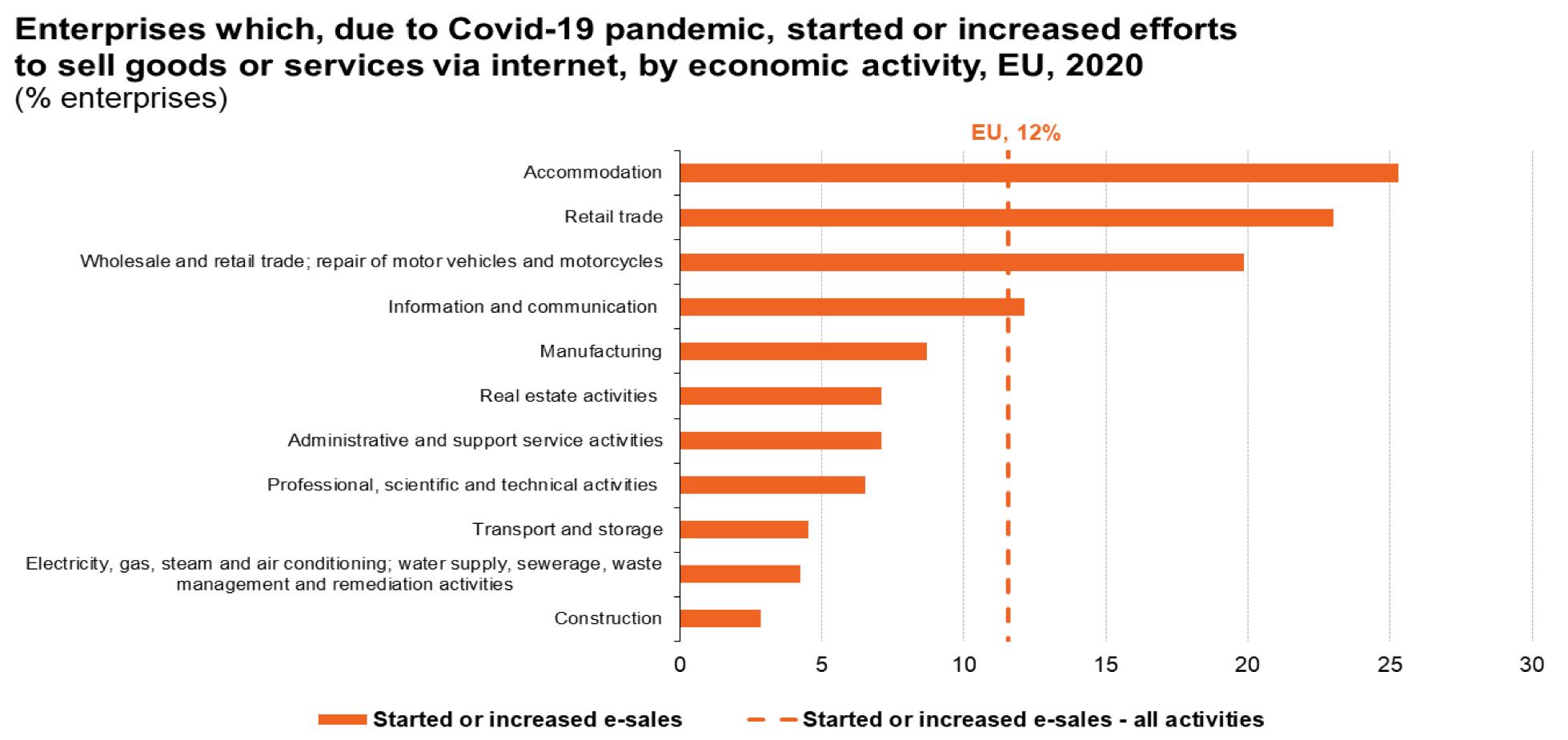
References:
Joint Research Centre (2022) europa.eu- The twin green & digital transition.
https://joint-research-centre.ec.europa.eu/jrc-news/twin-green-digitaltransition-how-sustainable-digital-technologies-could-enable-carbonneutral-eu-2022-06-29_en
Top 5 Digital Skills You’ll Need in 2021 (and Possibly in 2022 Too) (2022) workforce Singapore.
Indeed job portal. https://in.indeed.com/career-advice/careerdevelopment/digital-skills
World economic forum (2023). Future of job report 2023. https:// www3.weforum.org/docs/WEF_Future_of_Jobs_2023.pdf
Source: Eurostat
In conclusion, In the wake of the digital era, constant training and active learning play a vital role in equipping young people with the necessary digital skills to thrive in the job market. By actively engaging in training opportunities, young individuals can stay abreast of technological advancements, enhance their employability, and contribute meaningfully to the digital economy.
YES! Project
33
Regional Funds Online Magazine
In a world where competitiveness is made more and more crucial for young people to jump into the labour market, the value of training for upskilling is something we must focus on. This is why the European Year of Skills is supporting skills related events all over Europe and promoting training activities funded by the EU among young people. According to the European Commission, the number of young people who follow trainings on a regular basis is increasing. In 2019, the share of young people (aged 15-29) participating in education and training was at its highest level since 2005, with a rate of 74.7%. The digital skills needed in our era vary depending on the sector and the job. Generally, the most important digital skills are related to the use of computers, software, networks, and the internet. These include basic computer literacy, the ability to use word processing, spreadsheet, and presentation software, as well as the ability to use the internet for research and communication. Additionally, more advanced digital skills such as coding, digital marketing, understanding of data analytics, artificial intelligence, and machine learning are becoming increasingly important in many industries.
Even though there has been an increase in the use of digital skills since the pandemic, Italy is still far from the top places in digital skills at European level, despite being among the most important economies. According to Salesforce's Digital Skills Index, 86% of Italian workers claim not to have the digital skills companies are looking for today: a percentage that rises to 87% for the next five years. Again, according to Unioncamere - ANPAL, only in October 2022 the difficulty in finding STEM professionals exceeded 50%. In general, in Europe, there is the problem of 'web vacancy', a shortage of personnel with digital skills. As stated before, the pandemic brought an increase in the demand for digital skills and this can be seen as a major opportunity also for rural areas development, since most workers
can do their job from these areas. Therefore, it is of paramount importance to invest not only in the development of digital knowledge but also in the digital transition, facilitating access to web services by those living in locations far from the big cities. And young people can benefit from this type of investment both as recipients, but above all as key players in the development of new forms of employment.
YOUTHShare Project
34
Rosa Messuti, KAM of the “GAL La Cittadella del Sapere Srl”
Regional Funds Online Magazine
How much young people follow trainings on a regular basis? Which are the needed digital skills in our era? The case of Italy.
In terms of required digital skills, several stand out. Digital literacy forms the foundation, encompassing proficiency in basic computer skills, navigating the internet, and utilizing digital tools effectively. Data literacy is another vital skill, allowing individuals to analyze and interpret data, providing valuable insights for decision-making. Proficiency in programming and coding languages, such as Python and JavaScript, is increasingly in demand across various industries. Likewise, cybersecurity expertise is critical to safeguard digital systems and protect sensitive data from potential threats. With the growing prevalence of artificial intelligence (AI) and machine learning (ML), having a fundamental understanding of these technologies is advantageous. Knowledge of AI and ML algorithms empowers individuals in fields like data science, automation, and decisionmaking processes.
Digital marketing skills have also become essential. Competence in online advertising, search engine optimization (SEO), social media marketing, and content creation enables individuals to navigate the digital marketing landscape effectively.
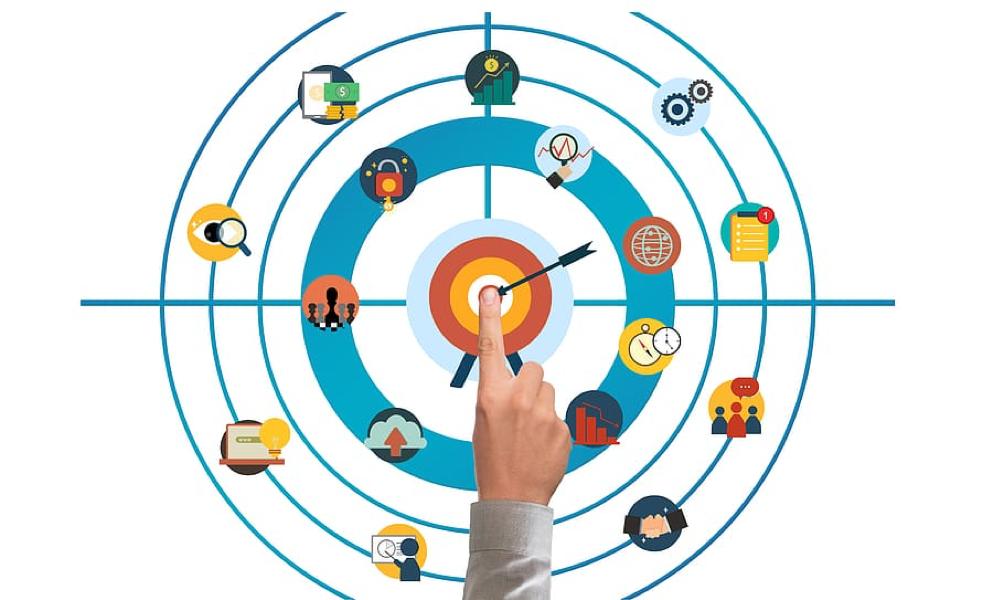
Cloud computing proficiency is highly sought after, with platforms like AWS, Azure, and Google Cloud providing storage, processing power, and application deployment capabilities.
Moreover, user experience (UX) and user interface (UI) design skills play a crucial role in creating intuitive and user-friendly digital interfaces for websites and applications.
But how many of youth actively pursue life-long training in all of these skills? And what are the obstacles that they face in a peripheral region of the EU, such Greece?
Young individuals recognize the importance of continuous learning and seek out life-long training opportunities, as they understand that acquiring new digital skills is crucial to adapt to technological advancements and secure employment in a highly competitive landscape. But still, the extent to which young people actively pursue lifelong training can vary depending on various factors such as the limited awareness and access of them located in island or peripheral regions, financial constraints as some of them, have to keep up with earning their living in precarious part time jobs working in cafes and restaurants and do not think or plan for the future! Even more, access to digital resources and infrastructure can be a challenge in peripheral regions, affecting young people's ability to engage in online training or utilize digital tools for learning. This digital divide can
35
In today's rapidly evolving job market, the digital and green transitions have brought forth new challenges and opportunities.
Regional Funds Online Magazine
To stay competitive, young people must acquire the skills demanded by employers.
create additional obstacles in pursuing lifelong training.
YOUTHShare project and YOUTHShare transnational employment Center in Greece acknowledges that is crucial to focus on improving awareness about the importance of lifelong learning, enhancing access to quality training programs, bridging the gap between education and industry needs, providing mentorship and guidance, and forging alliances for promoting the needed investment in digital infrastructure and connectivity in peripheral regions. Our effort is one step forward to digital inclusiveness of all youth! Our aim is to enhance the awareness campaigns and highlight success stories, showcase the benefits of digital skills, and encourage young people to engage in digital learning. On the same token, make all of them understand that the ability to adapt, learn, and acquire new skills continuously is invaluable.
Aimilia
Markaki, KAM of the “Network for Employment and Social Care (NESC)”
Bibliography:
chrome-extension://gphandlahdpffmccakmbngmbjnjiiahp/https:// www.unicef.org/media/103176/file/
Empowering%20the%20workforce%20of%20tomorrow.pdf
chrome-extension://gphandlahdpffmccakmbngmbjnjiiahp/https:// www.oecd.org/employment/youth/The-Updated-OECD-Youth-ActionPlan.pdf
YOUTHShare Project
36
Regional Funds Online Magazine
The digitalization of the labor market An analysis of the digital skills of society and youth in Extremadura, Spain
enrolled in middle and higher-level vocational training. According to the latest report published by the Ministry of Education and Vocational Training of Spain, there has been a significant increase in the number of enrollments in middle and higher vocational training, going from 377.937 students enrolled in the school year 2016-2017 to 531.864 students on the year 2021-2022, with the most popular training programmes being related to IC technologies and the health sector.
The engagement of youth in formal trainings in Extremadura has always been a topic of heated debate in the region. Prior the economic crisis of 2008, the school drop-out rate was at 38.1% on 2022, peaking at 39.4% on 2009, but thanks to the efforts of the national and regional government, this rate has been on a steady decrease for the last 20 years. As per the last data published by official sources, the rate of school drop-out in Extremadura hit an all-time low rate of 10,8%, making it the sixth lowest rate in the country and way below the national average of 13,9%. We can also see the impact the COVID-19 pandemic had in this rate, as there was a steep decrease in the between the years 2019 and 2022, going from a 20,5% to the current 10,8% dropout of today.
This decrease of the number of young people that did not finish formal education, considered here as those that did not finish the compulsory secondary school training itinerary, translated not only in an increase in those enrolled in upper-level education such as university, but also in those
But even though Extremadura has this very well-trained youth, different organizations related to youth engagement, like NGOs and specific departments and organizations from the public sector, and those specialized in innovation, technology and science, such as the Technological and Scientific Park of Extremadura, detected that there is a lack in digital skills not only from youth, but also from the private sector. It seems counterintuitive that a society that is so connected and with so many digital tools at the reach of their hand lacks the technical capabilities to use them properly, and that also applies to private companies that are supposed to be using digital tools and having an online presence in today’s digital market.
To help build these digital capacities, the team of FUNDECYT-PCTEX within the context of the RAISE Youth project has launched the RAISE Youth Digital Toolbox, an online repository of digital tools, trainings and other resources that can be used by young NEETs, entrepreneurs and companies alike. This web-app follows the No Code philosophy, a movement that believes that coding should not represent a barrier to entry when someone wants to build something digital and that actively create tools and resources that can be applied in a simple, non-technical way, but can get at some of the powerful capabilities that is possible through coding.
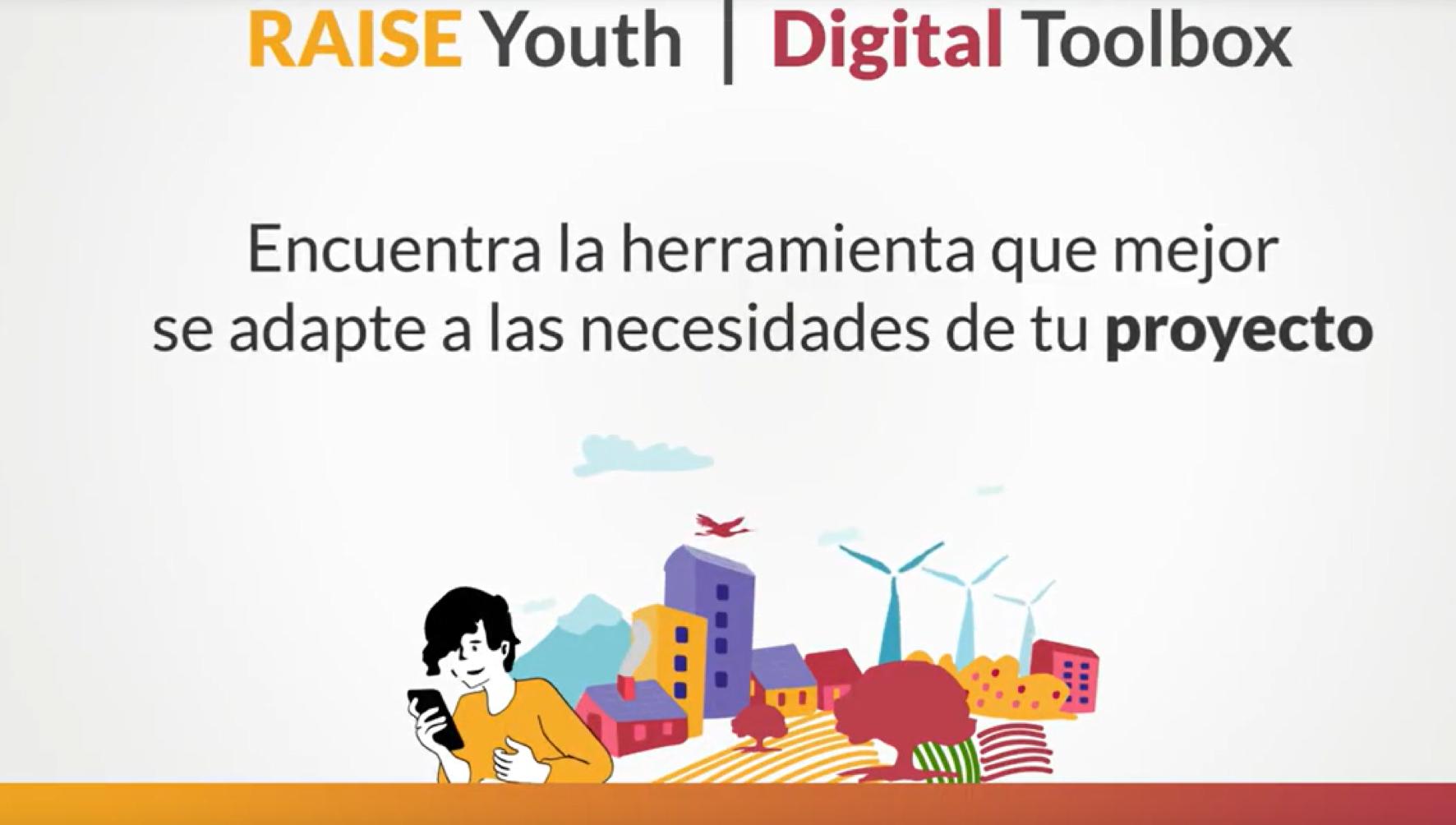
37
Regional Funds Online Magazine
Apart from this platform, the efforts of FUNDECYT-PCTEX culminated with the celebration of a webinar that served as a meeting point between young NEETs, job promotors and the private sector were those who attended could see the whole potential of the tools present in the toolbox, as well as create a small network of collaboration that would help them upskills their digital capabilities.
There are also other efforts being made in the territory to help improve the digital capabilities of society in general but of young people in particular. At the beginning of June, the Citizenship Skills Plan in Extremadura (Plan de Competencias para la Ciudadanía en Extremadura) was officially launched. Designed together with the Directorate General for the Digital Agenda of the Regional Government of Extremadura, the Extremadura Rural Development Network (REDEX) and the 24 Local Action Groups of Extremadura, this Plan, which has Next Generation funds and will run from mid-2023 to mid-2025, aims to contribute to the elimination of the digital divide through training capsules related to digital skills, e-administration and electronic procedures. With a budget of more than 3 million euros for the 24 rural districts of Extremadura, it is expected to train 16,000 people in the region, more than 600 people per district.
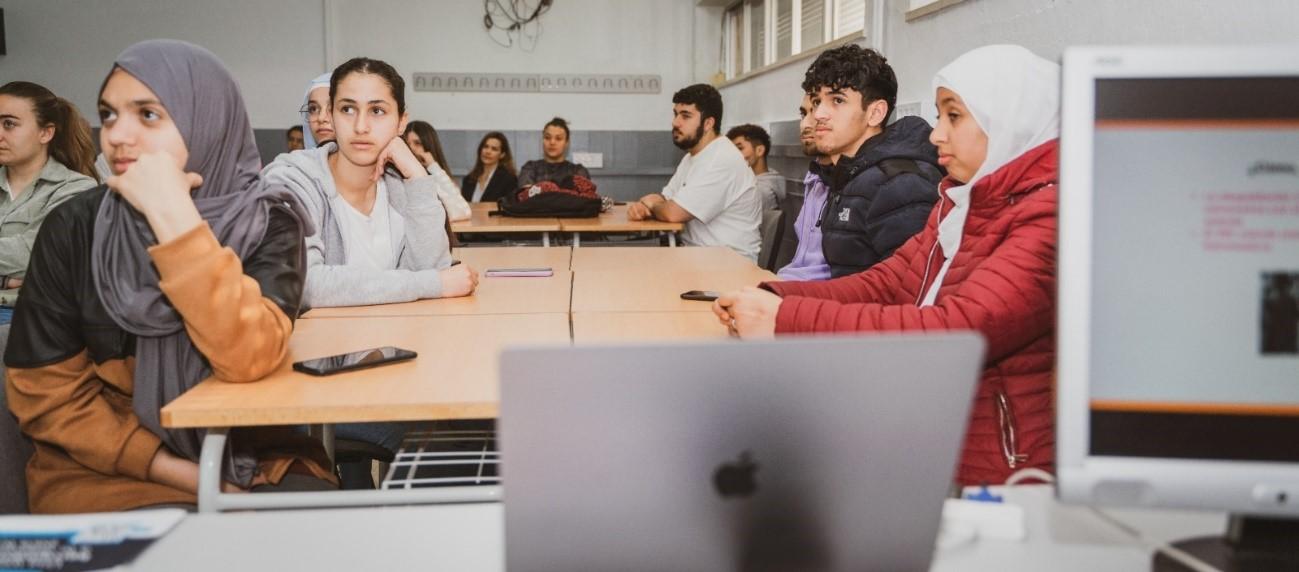
It is true that we can conclude that there is a challenge that society face regarding the upscaling of digital skills in today’s society, but efforts are being made from public institutions to help counter this phenomenon. By making digital tools and technology accessible to the population and by enabling them to use it correctly, we expect that, gradually, society will be able to acquire the digital skills needed to use technology competitively.
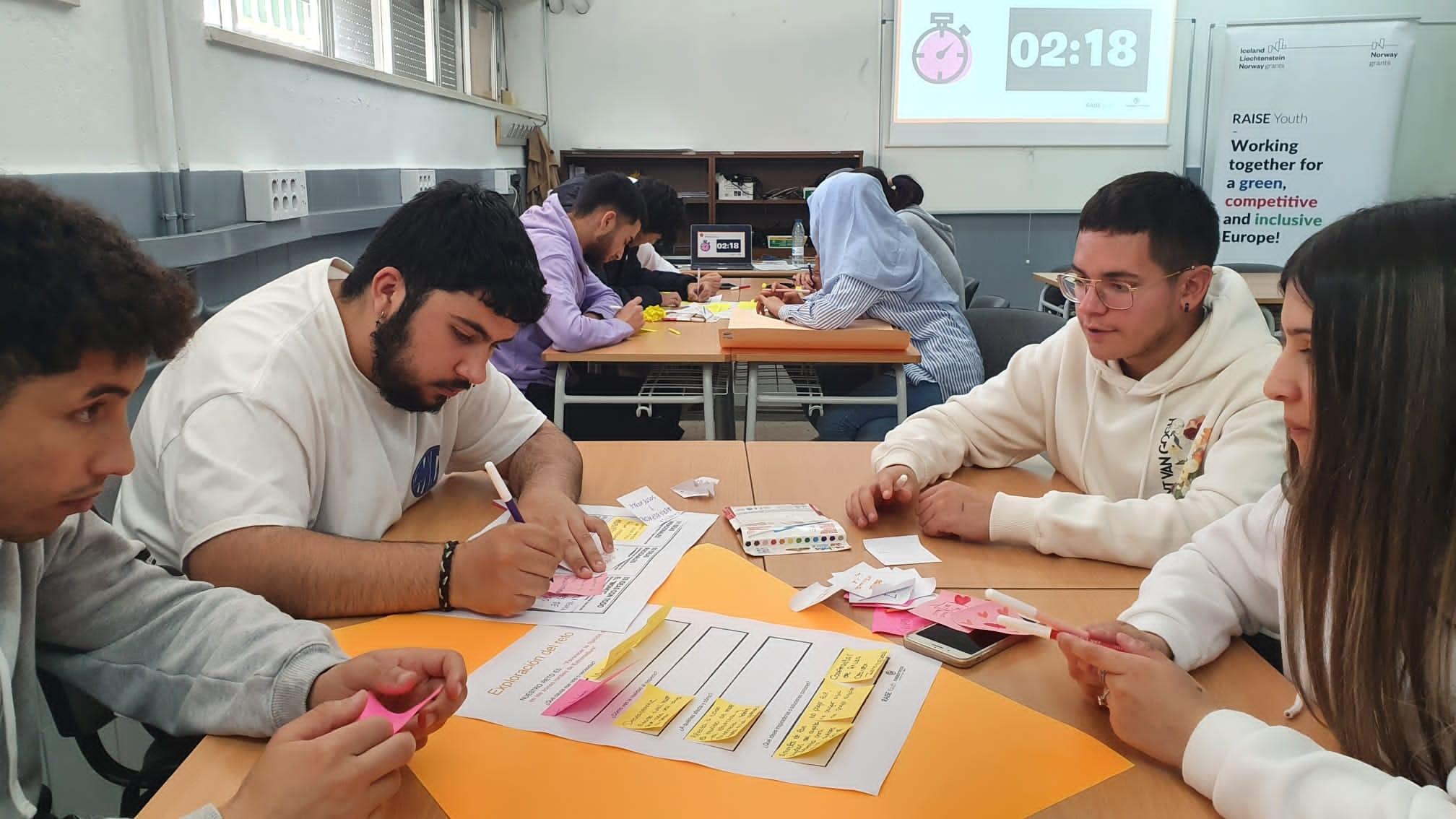
38
Regional Funds Online Magazine
RAISE Youth Project
Digitalisation enables a Circular Economy
The rapid technological changes in recent years have increasingly made digital and ICT skills a requirement in most occupations and sectors. During the Covid-19 pandemic, the requirement became a need, thus accelerating the transition to the digital age. A wide range of solutions were adopted that facilitated remote communication and cooperation, enabling businesses in many sectors to continue operating despite the circumstances. It also demonstrated the importance of acquiring essential digital skills such as email and instant messaging, word processing, social media, web-based research, data entry and handling and behaving safely and legally online.
Digital tools and services are constantly being created to provide solutions for any topic imaginable and this includes the transition to a circular economy.

In a circular economy, the life cycle of products is extended so that they may continue to play part of the economy for as long as possible and to avoid or reduce waste to a minimum. This is achieved through repair, reuse, recycling, sharing and leasing, to ensure the products or materials they are made from keep creating value.
Digital tools and processes can be employed to ensure resources are used in the most efficient way possible. They can also predict and address issues throughout the entire lifecycle of a product from its design and manufacturing, through to it being used and ultimately repurposed or remanufactured. It further makes possible for information related to materials to be available for better reuse, repair and recycling by consumers and recyclers.
As it was the case with other projects under the Regional Funds, the Circular Based Waste Management project began as lockdowns were enforced in response to the Covid-19 pandemic, where businesses resorted to remote work and travel was limited. Project activities that relied on travel and contact with the public, were replaced by online activities.
The public was engaged through surveys and creative competitions that were possible to carry through online. Learnings that were meant to take place by visiting sites, were initially replaced by webinars giving partners and their invitees the opportunity to hear from experts from across Europe about best circular practices for waste management from their homes. As the restrictions eased and the world opened to travel again, project partners took part in study tours that gave the opportunity to experience first-hand what they had learned about and more.
During both the webinars and study tours, the importance of digitalisation has been highlighted recurringly, with various initiatives taking place to develop solutions that can accelerate the adoption of circular practices. Such solutions are examining the entire value chain while making meaningful use of information collected in order to minimise waste and achieve optimal use of resources.
These examples make clear that digitalisation and adoption of digital skills are imperative for successful implementation of a circular economy. Brief descriptions of a few examples are offered next with links to our project articles about them.
39
Regional Funds Online Magazine
In one example from Norway, the waste management company sends a notification on a mobile app to customers when the bins are to be emptied. In areas where residents use shared bins, these can be opened with an access card and the frequency with which they are used is recorded. Such systems help the company understand which fractions of waste are discarded most and how much and when residents are using the bins. In another example, a software solution is helping reduce waste and increase recycling by rewarding citizens that sort their waste well, based on the data collected on what is being discarded and sorted.
In Upper Austria, a number projects examine the role digitalisation plays in making recycling easier, raising awareness as well as developing business models. One initiative by the Linz Institute of Technology, located at the Johannes Kepler University, combines education, research and business development through smart polymer processing. It considers the entire life cycle of plastics to ensure quality performance and management through software tools. Plastics is among the main industries in the region of Upper Austria and as such, initiatives are taking on the challenge to solve the issue of plastic waste and its recycling by focusing on the entire lifecycle of plastics.

In the Rioja region of Spain, the first centre for innovation for a Circular Economy has been established, where new ideas and solutions for implementing circular practices in waste management are supported and developed. One of these is a digital simulation of a waste treatment plant which helps optimise its operations while allowing to predict outcomes depending on how parameters change. In other projects, the potential of blockchain and digital watermarks are explored to be able to trace a material back to its origin, thus ensuring material quality.
Another software tool helps predict the environmental impact of packaging containers and gives information on how it will behave after it is discarded and reincorporated as a new product. It also gives suggestions for improvement during the design stage to make the container more sustainable. Furthermore, an online platform is developed that uses data collected from waste collection operations and combines them with municipality demographic data to optimise waste collection routes and
resources. Citizen behaviour, gamification and incentive programmes are also being studied where with the use of mobile phone applications citizens are encouraged to actively participate in recycling schemes in exchange for rewards.
In Ljubljana, Slovenia, the first capital in Europe to declare the zero waste goal, digitalisation is seen as a key enabler for the city and wider region to achieve its Circular Economy Strategy. The local waste management company uses the pay as you throw systems, where the price depends on the volume of the container and number of people living in a household. Citizens have access to an online platform where the entire process of waste collection is transparent, and they can see how much waste they are throwing and are billed for.
In Scotland, UK, circular practices are connected to social issues. One such issue tackled, is digital poverty. Initiatives are in place to collect and repair laptops among other old or unwanted electronic items. Thes are then gifted to people that cannot afford one or sold at a much lower cost.
40
Regional Funds Online Magazine
Information has become easily available through technology, collected and consumed as a commodity, as such, our modern age is regarded as the Information Age. The examples above offer a glimpse on the influence digitalisation and data collection will have on the waste management sector and the wider adoption of circular practices. They also demonstrate that new job roles are being created with a high demand for digital skills beyond the essential ones. Skills in data collection and analysis, content creation, programming for web and applications development, coding and user experience design are and will continue to be heavily sought, as reliance on digital tools is becoming mainstream in most sectors, including waste management.
Maritsa Kissamitaki – Circular Based Waste Management Project
http://circular-waste.eu
Circular Based Waste Management Project
41
Regional Funds Online Magazine
Blue Generation Project updates From the Projects
International Study Visit
59 Young people from Bulgaria, Greece, Poland, Portugal, Spain, and Romania participated in the international study visit implemented with great success by BlueGeneration Project in cooperation with the Marine Cluster Bulgaria in Varna, 20st - 24th March.

Participants had an in-depth learning experience and networking opportunity, tailor-made to their career interests:
• in ship building and maritime transport, they interacted with professionals and academics, attended presentations, and practiced on the latest technological equipment, i.e., drones and boat simulators.
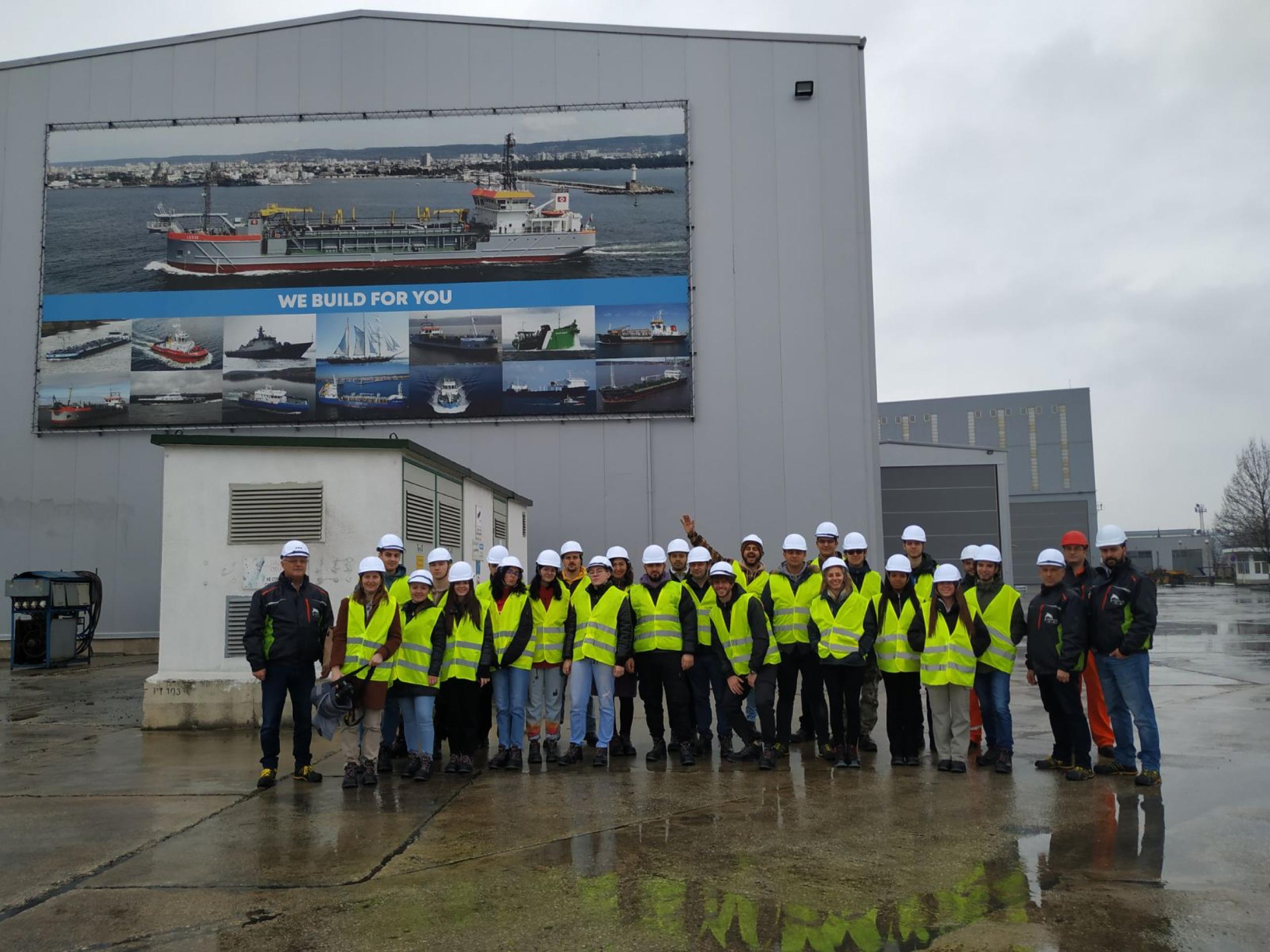
• in coastal tourism, they visited high-end facilities on the Black Sea, offering a variety of high-quality hospitality services, where they discovered new ways of seeing things and best practices that may be transferred to their local businesses.
The team visited the Nikola Vaptsarov Naval Academy - Bulgarian Maritime University, the Bulgarian Ship Hydrodynamics Center, the MTG Dolphin Shipyard, College of Tourism - Varna, Aquahouse Thermal & Beach, and
42
Regional Funds Online Magazine
Св Св Константин и Елена
National Conference in Poland by FRSP
On 21 March 2023, at the Centre for Non-Governmental Organisations in Katowice, the third local conference within the "Blue Generation" project took place entitled. "Ocean of opportunities - development perspectives for young people".
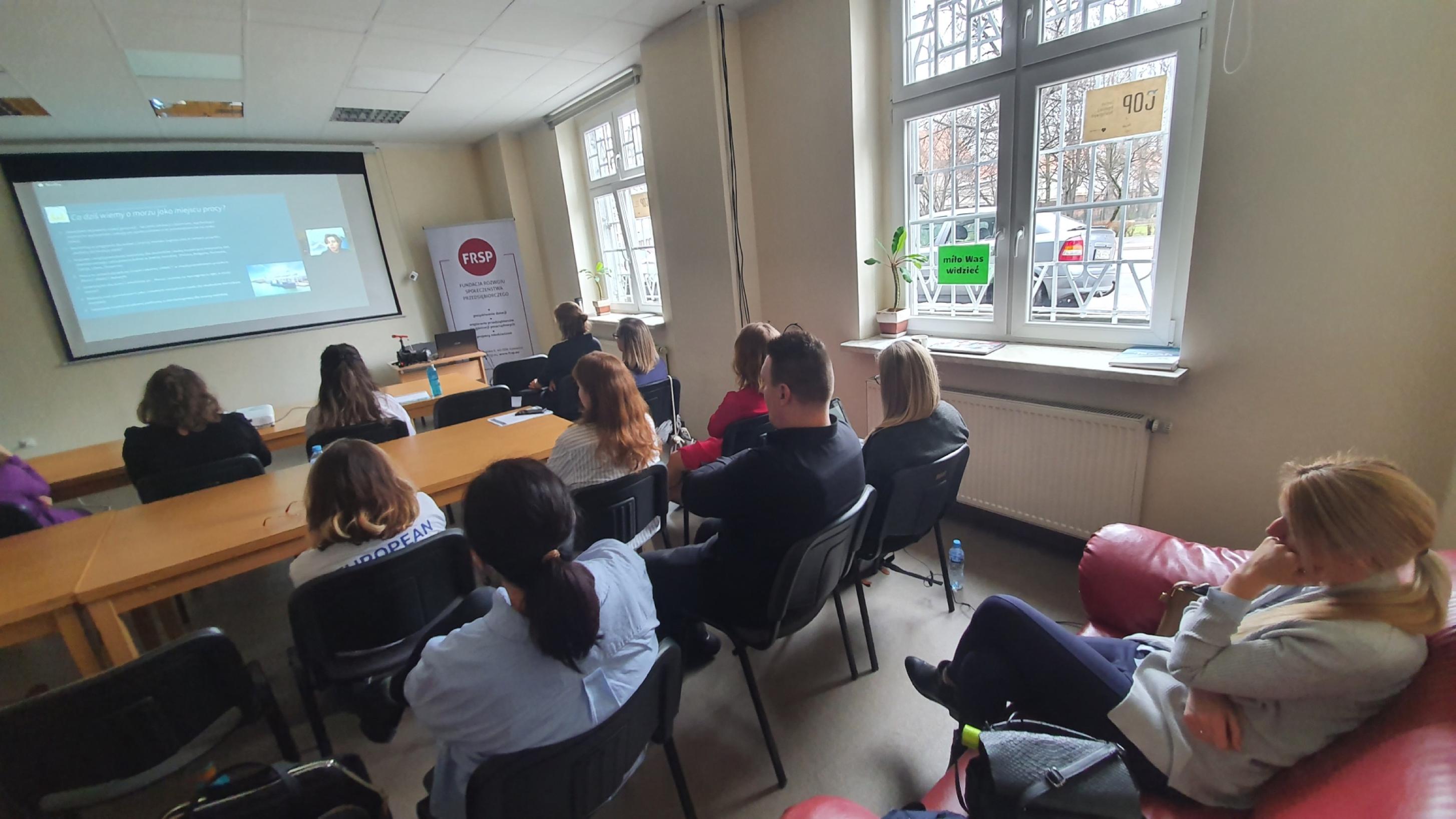

The aim of the conference was to introduce young people, as well as youth workers (such as career counsellors, teachers, employees of business incubators, career offices and job centres) to the perspectives offered by the Blue Economy in the sphere of education and employment.
At the beginning of the conference, the President of the FRSP, Marcin Germanek stressed the importance of the Blue Economy for the economic development of Poland and the EU. Next, the floor was taken by Ewa Skowronska, coordinator of the Blue Generation project, who presented to the participants the successes of FRSP in the project to date and outlined the plans and tasks for the next few months.
Each of the invited guests introduced our participants to the opportunities offered by the Blue Economy in the aquaculture, maritime transport and other broader maritime sectors (e.g. work in the navy, human resources management in companies cooperating with shipowners, waitress service on passenger ships, etc.). Each of the speakers emphasised that work in the maritime economy is specific, as it requires passion and commitment, but at the same time gives a lot of satisfaction and many employers now need (and will need) qualified and experienced staff. After each speech, participants had the opportunity to ask questions of our guests.
The conference was attended by 20 participants (young people and career counsellors). Promotional activities related to the conference were carried out from mid-February 2023.
43 Regional Funds Online Magazine
National Conference in Greece by Militos and Helmepa
500+ young people aged 15-29 years old participated with enthusiasm in Blue Generation's open and active workshop on "EMPLOYMENT OPPORTUNITIES IN THE BLUE ECONOMY", held at the War Museum of Athens on Thursday, May 11, 2023, aiming to connect young people with professionals in the blue economy, education, and sustainable development.
Impressive was the mood of the young people for direct interaction with representatives from the sectors of Coastal Tourism, Fisheries and Aquaculture, Marine Biotechnology, Ocean Energy, Marine Transport and Shipbuilding, who shared their knowledge and experiences with the audience and guided them in planning their careers.
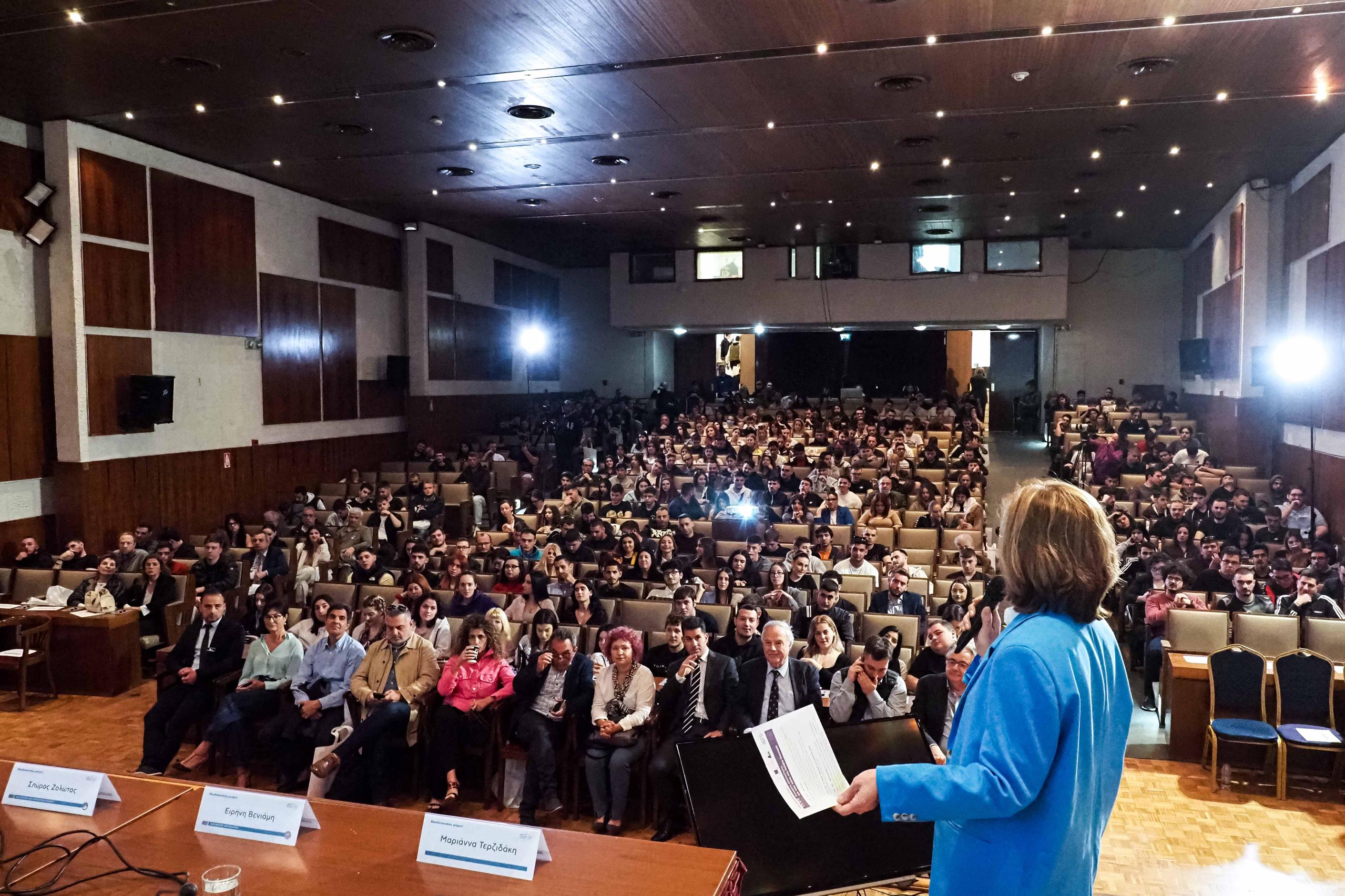
Topics highlighted:
• Professions that are in high demand and require varying degrees of specialization, such as: Software Engineer in creating applications for Shipping and Yachting, Sailor in marina management, Sailor or Sales Marketing Executive in Aquaculture, Technician pipe fitter or Welder in Shipbuilding and Maintenance, Regulatory Framework Engineer in Ship Inspection and Marine Spatial Planning, Storage Manager in Port Management, Periballontologist in Marine Wind Farm Design, Biologist in the development of cosmetics from marine organisms.
• Sustainable development is a key pillar of the blue economy and professionals in all sectors should be aware of and integrate its objectives into their activities.
• Soft skills, such as resilience, teamwork, communication skills, the desire for continuous learning, personality traits cultivated through volunteering, practice, and experimentation, were highlighted as an important factor in finding a job and professional success,
• We would like to thank the distinguished representatives of the Blue Economy who participated in the conference and shared their knowledge and experiences with the enthusiastic young audience (presented in alphabetical order):
The workshop was implemented by Militos Consulting S.A., Leader of the European #BlueGeneration initiative in collaboration with HELMEPAHellenic Marine Environment Protection Association, a partner in the consortium. Warm thanks to IEK DELTA (VET Center) for their support and to the Elefsina Port Authority, under whose auspices the workshop was implemented.

44 Regional Funds Online Magazine
Blue Generation Project
Interview Iwona Chlubek
determining the color of napkins and varieties of roses, to the implementation of large decorations in wedding halls. I love the thought that with flowers, with my participation, this special day becomes even more beautiful. So I decided to take matters into my own hands and the FlowerDay project was born.
Have you always dreamed about it, or was the idea born spontaneously?
I knew I wanted to work with flowers. I was sure of that. However, I did not make the decision to start my own business spontaneously. It was preceded by many thoughts, analyzes of market opportunities and my abilities. So the decision was rather rational.
What does your work look like on a daily basis?
"I dream of creating a space where I can share my passion and show how to easily invite art and nature into my life." – says Iwona Chlubek, a graduate of the Young Entrepreneurs Succeed!

Iwona, you have just started your own company - you offer a comprehensive floristic setting for events. Please tell us how it happened that you chose this path for your business. I think it was due to several factors. I have loved art, nature and creative manual work since I was a child. The course of education helped me gain valuable knowledge. I also worked for several years in flower shops, gaining practical skills. Against the background of all my experiences, I felt that my favorite challenges were those related to the organization of large events - primarily weddings. From the stage of looking for inspiration,
In the wedding business, work is seasonal. During the summer months, at night, I search for the most beautiful flowers at the market, then I condition them properly and prepare compositions, bouquets and all elements of the decor. I travel between the venues of the ceremony and the wedding halls, taking care of both the assembly of decorations and their disassembly after the ceremony. It is physical work, in the field, under time pressure. Everything must be buttoned up, every flower fresh and in the perfect shade of pastel pink. Everything according to the plan.
But that doesn't mean I only work part of the year. At the end of the season, I smoothly switch to office work mode. It is then that I have the most conversations with clients, create offers and valuations, complete formalities, plan purchases and order logistics. This is the part of my profession that is not usually visible, and also requires a lot of commitment and time from me.
45
Regional Funds Online Magazine
“Instead of what seemed like a logical and safe option, I chose dreams!” –
find out about Iwona's story
Please tell us about your situation before joining the program realized by the Youth Business Poland Foundation. Before joining the program, I focused mainly on my own education. I graduated from master's studies in gardening, floristic school and for several years I was gathering professional experience. So I knew how to work with flowers, but I had no idea how to run a business.
What did participation in the YES! program give you? – Young Entrepreneurs Succeed implemented by the Youth Business Poland Foundation?
Firstly, it gave me the basic knowledge of running my own business. It allowed to systematize, rethink and plan many business issues. Experts from various fields shared their knowledge, answered our questions and dispelled doubts. At the beginning of the road in business, this is invaluable.
But YES! - it's mostly people. Meeting other people with their ideas was extremely inspiring for me. Most of them were my peers, starting in various industries, sometimes with very innovative projects. Their zeal and enthusiasm was very motivating for me.
What has been the biggest challenge for you so far in developing your own business?
Running a sole proprietorship requires me to be active in all areas related to the company. The most important thing for me is contact with the client and the execution of orders. However, at the same time, I have to keep up to date with regulations, accounting and social media. In the multitude of duties, there is not enough time for further training in individual areas. I know that in addition to floristic courses, I could also devote time, for example, to training in e-marketing. However, you can't be the best at everything, and it's important to find time to rest as well.
Thinking about a breakthrough moment in developing your businesswhat is the first thing that comes to your mind?
The beginning was the most groundbreaking. Decision on the choice of fields of study and development path. Gardening instead of previously planned dentistry. Then I took a chance for the first time. I decided to
pursue my dreams instead of choosing what seemed like a logical and safe option. Every next step was a consequence of that decision.
What are your future business plans?
I definitely plan to expand my business beyond the wedding industry over time. I really enjoy working with people and I would like to do more and more of it. That's why I'm thinking about running floristic workshops. I dream of creating a space where I can share my passion and show how to easily invite art and nature into my life. It will be a place for everyone who wants to learn something new and spend creative time in good company.
What do you think is the key to success in starting your own business?
I think it's determination and patience. And it's both to the people with whom we will cooperate and meet on our way (clients, officials), but also to ourselves and our business. It is extremely important to be able to anticipate possible scenarios, realistically plan, and at the same time flexibly modify one's intentions and adapt them to factors beyond our control.
Do you have a "recipe for success"? What advice would you give yourself as you start your own business?
Not all at once! At the beginning, the number of issues and topics to deal with is enormous, and the experience is minimal. It takes a lot of time to acquire the necessary knowledge in all areas. I remember how frustrated I was that there was so much I still didn't understand. However, there are many people around us, talented in various fields, who willingly share their experience. Therefore, the most important thing is not to be afraid to ask questions and not to be ashamed to accept help.
Iwona, thank you very much for the interview.
You can find Iwona's works here:
Instagram: flower_day_florystyka
Facebook: FlowerDay YES! Project
46 Regional Funds Online Magazine
Interview Ania Krupinska
“We are like grandparents in the countryside. Because it's our job, we have more time to pamper the dogs than their owners do on a daily basis. They have dog friends with us, they go to the forest, they have exercises for brain development, slimming fitness or rehabilitation treatments.” – says Ania Krupi ń ska-Roma ń ska, a graduate of the Young Entrepreneurs Succeed program.
Ania, you run a hotel for dogs. But this is not just a hotel - it is also a place that provides rehabilitation to animals that need it. How did you choose this path for your business?

I have been working with animals for almost 10 years. During this time, my vision of the future has changed many times. At first, I thought that I would be a veterinarian technician until old age, that is, the doctor's right hand in the clinic. In the meantime, I also became a zoopsychologist and a zoophysiotherapist. I was looking for an activity that would allow me to combine all my super powers.
Observing the market for years, I discovered that there is a lack of hotels for dogs, which on the one hand are homely and intimate, but also professional and safe. I used the help of the Youth Business Poland Foundation last year, when I really wanted to expand my business with stationary rehabilitation for dogs. The foundation gave me great support in
planning activities and tools to explore whether my dream will be primarily helpful to dog owners.
Has running a hotel for dogs always been your dream, or did the idea arise spontaneously?
Running a hotel could not be my dream because I was allergic to dog fur. In addition, if I saw hotels from 20 years ago (which looked like sheltersdogs in boxes) I would not like it and I would experience it for a long time, because I loved animals very much from the beginning. Unfortunately, such hotels still exist today.
Therefore, when my vision of this business came together, I knew that it would be a place that would provide support to carers of sensitive or sick dogs. I always wanted my work to matter. Now, when the carers say that for the first time in many months they could leave the house, rest, because we took the responsibility for their dog's health and safety off them for a moment, I know that we are doing a good job.
A hotel for dogs seems to be an unusual business idea. Or am I wrong? What does your work look like on a daily basis?
Yes, it's definitely an unusual idea. Especially in a formula like ours. Hotel dogs live with us in the house. Not in a separate area, not in another building. They sleep with us in bed or on the couch. They cook meals with us, accompany us in everyday household activities, such as washing or cleaning. Sometimes our hotel is the only option for dogs with separation anxiety. We laugh that we are like grandparents in the countryside. Because it's our job, we have more time to pamper the dogs than their owners do on a daily basis. They have dog friends with us, they go to the forest, they have exercises for brain development, slimming fitness or rehabilitation treatments. Sounds like an idyll, but it is also a huge responsibility and readiness to constantly adapt to new residents and their individual needs.
47
Regional Funds Online Magazine
"I believed in myself! Today I run a hotel and classes for dogs” –find out about Ania's story
Please tell us about your situation before joining the program implemented by the Youth Business Poland Foundation. Before joining the program, I had very clear and thoughtful dreams. I was running a hotel and I still felt like I didn't have the plan or the funds to move forward with development. The prices of hotel services and the number of dogs admitted cannot be freely increased due to the economic situation and the standards of service that I have set for myself. I performed behavioral, training and rehabilitation services only with access to the client. The only possibility for further development was to create space for me or other specialists to perform these services on site. Unfortunately, I was blocked by my usually unfounded beliefs about my abilities, knowledge and finances.
What did participation in the YES! program give you? – Young Entrepreneurs Succeed?
The program is attended by people at various stages - from the initial idea to the detailed plan. That alone broadened my horizons. I saw how much work I have already done and that it is not worth giving up at this stage. I understood that years of work in the profession allowed me to get to know my clients and their needs well.
The workshop leaders are long-time entrepreneurs and specialists in their field. This awareness that we are not talking only about dry theories gave me a sense of security. During the course, we were provided with a lot of materials that forced me to make specific thoughts, decisions - also to face my weaknesses and fears. I think that without facing it, there is a huge risk of failure.
I also understood then that in business you have to be aware and constantly on the move. Dreams are not everything. You have to calculate coldly and see if you can make a living out of it. All this was supported by a lot of positive energy and the words "wow, this convinces me, it's worth getting into it, you're doing a great job". Throughout this difficult process, I felt the support of the entire Youth Business Poland team. At the very end, I also received a free series of mentoring meetings from the foundation. The process of working with a mentor is probably the most valuable adventure I have experienced in my professional life.
What has been the biggest challenge for you so far in developing your own business?
The biggest difficulty I work with all the time is advertising. Starting from sincere praise of my services (in which I deeply believe), talking about my successes, e.g. in dog behavioral therapy or rehabilitation, and ending with posting promotional content on social media showing my work and offer. Definitely, years ago I should have stood up straight and showed animal carers how I can really help them. In a situation where you do not have the finances for a professional advertising agency, the above-mentioned difficulties strongly blocked the development of my company.
Thinking about a breakthrough moment in developing your businesswhat is the first thing that comes to your mind?
The first turning point was when I decided to open my own hotel. Another is to complete the construction of the house in 2021 and transfer the services to your home on your own terms. The biggest breakthrough in my business was understanding during the course run by the Youth Business Poland Foundation that if I look at what I do not have and cannot have for the time being, I will stay where I am. I have come to terms with the fact that the "Centre for Comprehensive Neurorehabilitation of Dogs and Cats" project is a huge and expensive idea that needs to be divided into parts. My husband and I laid tiles in the garage and finished this room for training and rehabilitation of dogs. Within these few months, the scope of our services has significantly expanded. In addition, another person with new skills joined our team. All our services are starting to wind each other up.
What are your future business plans?
The first stage is to start the promotion of the room to such an extent that registration for classes is a month ahead. Maintaining the quality of the hotel so that the care schedule is always full. Adaptation of the area we have for activities for dogs. So the basic plan is to use 100% of the
48 Regional Funds Online Magazine
"The process of working with a mentor is probably the most valuable adventure I've had in my professional life."
potential that we already have today. All the time I have an entry with the offer of online training in the back of my mind. And my icing on the cake, i.e. the "Centre for Comprehensive Neurorehabilitation of dogs and cats" on an international level.
Do you have a "recipe for success"? What advice would you give yourself as you start your own business?
An 18-year-old Ania would be really, really good at what she does and shouldn't let anyone question that. Nor should she ever agree to unpaid internships where she cleans rather than learns a trade. It will be very hard and work a lot, but it's very good, because she will raise money to make her dreams come true, and the feeling that she made it will give her a lot of self-confidence forever.
Ania, apart from textbooks and work, sometimes go to the park, exercise or meet friends - it will do you good.
Anna, thank you very much for the interview.
YES! Project
49 Regional Funds Online Magazine
The future of work for NEETs in a circular economy
The circular economy is expected to be one of the biggest economic drivers. Relevant sectors to the circular economy employed already more than four million workers in 2016 and are predicted to create many more jobs in the EU until 2030. The increase is due to a shift in value added from resource-based capital gains to workers’ compensation and services and higher technology utilization. The following thinking space explores the state of the circular economy and its employment opportunities for NEETs. The circular economy - a model for sustainability in resource use and consumption - is expected to be one of the biggest economic drivers1
Relevant sectors to the circular economy employed more than four million workers in 20162, a 6% increase compared to 2012. Recent estimates predict the circular economy to generate a net employment increase of about 700.000 jobs in the EU by 2030.3 The International Labour Organisation (ILO) confirms that „...a low-carbon, resource-efficient economy employs more people, is more labour intensive, and is at least as productive as an economy with a production model based on high carbon, resource and material intensity. ... this is due to a shift in value added from resource-based capital gains to workers’ compensation and services, higher technology utilization and longer value chains.”4 This thinking space paper will take a closer look at the circular economy, as it seems a promising concept with employment opportunities for NEETs.
The circularity principle is not new and its regulatory framework is emerging in Europe. In some areas, such as remanufacturing of machinery, medical devices, heavy duty and off-roads or B2B electronics5, the circularity is a longstanding practice. 6 However, the Global Circularity Report numbers the world’s circularity at only 9.1% circular in 2019.7 A few governments have begun to apply the concept: for example, Finland has endorsed a circular economy strategy8 and the Netherlands is aiming to become 50% circular by 2030 and 100% by 2050.9 The EU has published a circular economy action plan10 in 2015 and has been setting increasing recycling targets for Member States in waste regulations. EU Ecodesign
measures contain repair requirements for household products that manufacturers have to comply with as of April 2021.11
Circularity requires optimization of the utility of products by maximizing their use, extending their lifetime, enhanced recycling, using waste as a resource and circular design, reducing material consumption and using lower-carbon alternatives. New jobs are predicted to be created in industries such as agriculture, renewable energy, construction, waste, repair and rental services and manufacturing that should deliver net gains.
12 By benefiting jobs in services, and if the gender distribution across sectors remains similar, the circular economy will, according to ILO, rise the female share of employment as well as highly skilled jobs. It will also result in a small increase in the numbers of own-account workers.13
Emerging studies on employment in the circular economy, such as for the City of Amsterdam show that circular jobs types will differ according to the location.14
While today’s production processes rely on global supply chains, the Circular Economy is expected be much more local or regional as cost efficient repair, maintenance and services around a product will take place close to the consumer. Local jobs would be created that could not be readily outsourced to lower-cost markets, given the need for skilled workers to turn old goods into new resources, to collect and process recycled materials, and to source materials locally.15 A report of 2015 finds for the UK that regions where unemployment is higher, such as the North East and the West Midlands, could see the greatest impact on job creation, especially among low to mid-skilled occupations. Drawing on various studies, the report pulled together the below table with employment types created in the waste and remanufacturing sectors in a circular economy.16
50
Regional Funds Online Magazine
The Circular Economy has the potential to be more social and inclusive and strengthen community- based initiatives. There is already a multitude of local networking initiatives such as the wwoofers17 repair cafes18 or repair shops19, local platforms where citizens exchange services20, support young people 21 or tool-sharing platforms 22 . These local community approaches could be a starting point for successfully supporting NEETs and guide on how to set up initiatives such as a tool library can be found online23. In addition, NEETs supporting organisations should enter in a dialogue and cooperation with circular economy relevant sectors and organisations to help the young people to enter sustainable circular jobs.
2 https://ec.europa.eu/eurostat/tgm/refreshTableAction.do? tab=table&plugin=1&pcode=cei_cie010&language=en
3 European Commission. 2019. Impacts of circular economy policies on the labour market. Available online via https:// circulareconomy.europa.eu/ platform/sites/default/files/ec_2018__impacts_of_circular_economy_policies_on_the_ labour_market.pdf
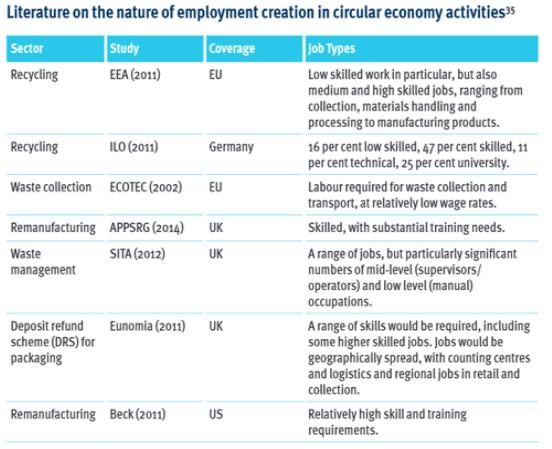
4 ILO (2018), WORLD EMPLOYMENT SOCIAL OUTLOOK 2018. Greening with jobs, Geneva, p.38
5 Mobile and fix telecom network equipment, datacentre equipment, etc.
6 European Remanufacturing Network (https://www.remanufacturing.eu/ case-study-tool.php),
7 THE CIRCULARITY GAP REPORT Closing the Circularity Gap in a 9% World, 2019, https://docs.wixstatic.com/ugd/ ad6e59_ba1e4d16c64f44fa94fbd8708eae8e34.pdf. In January 2019, the social enterprise Circle Economy released its second Global Circularity Report at the World Economic Forum (WEF) Annual Meeting.
8 https://www.ym.fi/en-US/The_environment/Circular_economy
9 https://www.government.nl/documents/policy-notes/2016/09/14/acircular-economy-in-the-netherlands-by-2050
10 https://ec.europa.eu/commission/priorities/jobs-growth-and-investment/ towards-circular-economy_en
11 Publication of these measures is foreseen for the end of 2019. Measures can be found on the comitology registry of the European Commission.
12 ILO (2018), p.51
13 ILO (2018), p.53.
14 https://www.circle-economy.com/wp-content/uploads/2018/12/FinalCircular-Jobs-and-Skills-in-the-Amsterdam-Metropolitan-Area.pdf
1 https://www.euractiv.com/section/digital/interview/katainen-innovationneeded-to-address-climate-issues
15 Source: https://knowledge.unccd.int/publications/resource-efficiencypotential-and-economic-implications-smarter-use-natural-resources. “For example, between 2005 and 2010, a programme in the United Kingdom recycled or reused seven million tonnes of trash destined for the landfill. This move saved six million tonnes of carbon dioxide emissions, close to 10 million tonnes of virgin materials and 10 million tonnes of water. It also increased business sales by £176 million, reduced business costs by £156 million and created 8,700 jobs.”
51 Regional Funds Online Magazine
16 WRAP and the Green Alliance (2015). Employment and the Circular Economy. Employment and the Circular Economy – Job creation in a more resource efficient Britain, online at: http://www.wrap.org.uk/content/ employment-and-circular-economy
17 E.g. https://wwoof.be
18 https://repaircafe.org/en/about/
19 E. France: http://emmaus-france.org/, http://www.envie.org/; Greece: http://www.ecorec.gr/; Spain
http://www.aeress.org/ ; Italy: http://www.insiemesociale.it/
20 E.g.: http://selunivers.be/
21 E.g.: http://gpclimat.be/
22 E.g. the Toronto Tool Library - www.ellenmacarthurfoundation.org/ case_studies/how-tool-sharing-could-become-a-public-utility
23 https://www.shareable.net/how-to-start-a-tool-library/
52 Regional Funds Online Magazine
YES! Project
Publishing a paper on the assessment of the implementation of the Youth Guarantee Policy in the EU South.
On 16 May, the paper ‘In what way a ‘Guarantee for youth’? NEETs entrapped by labour market policies in the European Union’, by E. Emmanouil, G. Chatzichristos, A. Herod and S. Gialis prepared in the framework of the project ‘A Place for Youth in Mediterranean EEA: Resilient and Sharing Economies for NEETs (YOUTHShare), was published by the journal of Youth Studies ( https://doi.org/ 10.1080/13676261.2023.2211943).
reaffirm spatial inequalities and the potential for young workers to be kept in a perpetual state of precarious employment, at least in the Southern EU countries where economic reality means that secure, well-paid jobs are generally not being created. This reinforces an argument, largely ignored by neoliberal economic theory, that it is not workers' incentives to improve their own employability that create decent jobs but, rather, it is the nature of capitalist economies that does or does not (Wright 2000) - in other words, if decent jobs are not being created, it does not matter much whether young people have the skills to do them or not.
The current study adopts a Geographical Political Economy approach to analysing the Youth Guarantee’s underpinnings and the conditions that differentiate its implementation on a regional level, exploring whether–and, if so, how–the YG helps young people in the Southern EU to enter the labour market. The paper introduces the first comparative, cross-regional investigation of the YG programme, targeting the NUTS-II regions of Spain and Italy, using mixed methods, supplementing quantitative analysis with in-depth interviews with key informants. In particular, it explores two important questions: 1) have recent efforts to implement YG Action Plans helped young NEETs (that is, people between 15 and 29 years of age not in employment education or training) in the Southern EU to enter the labour market?; and 2) what are the conditions that differentiate YGs’ implementation at the regional (NUTS-II) level?

It concludes that the patterns of youth inactivity and unemployment are not only the result of the underperformance of the YG programmes, but, also, of assumptions about worker self-improvement that largely ignore the very mechanics of how labour markets actually work. Such assumptions
References Wright, E. O.2000.“Working-Class Power, Capitalist-Class Interests, and Class Compromise.” American Journal of Sociology105 (4): 957–1002.doi: 10.1086/210397.
YOUTHShare Project
53
Regional Funds Online Magazine
Effie Emmanouil PhD candidate, University of the Aegean, YOUTHShare Project
Summary of Workshop “Funding and financing carbon capture and storage (CCS) in Central and Eastern Europe”
At the end of March 2023, a workshop addressed to CCS stakeholders from the Central and Eastern Europe (CEE) region was held. Organised by the CCS4CEE project consortium, it was dedicated to the topic of funding and financing CCS in CEE. The event attracted more than 100 online participants and was packed with important presentations from representatives of EU and Member State institutions, companies active in the CCS sector, and research organisations.
After an introduction by our two co-hosts: Valts Ulmanis from Civitta and Luciana Miu from Energy Policy Group, Daniel Kitscha from DG CLIMA (European Commission’s Directorate-General for Climate Action) explained the rules and upcoming deadlines for applying for the Innovation Fund. Mr. Kitscha highlighted CCS is one of the 5 innovative technologies necessary to reach climate neutrality by 2050, reflected in the number of CCS projects awarded funding under the Innovation Fund.
In the second presentation, Dimitrios Koufos from European Bank for Reconstruction and Development underlined that reaching the goal of the Paris Agreement will require massive deployment of CCS by 2050, and highlighted the role of EBRD in supporting the deployment of such projects. He also emphasized the importance of public acceptance for CCS deployment.
Kathrine Thomsen from the Danish Ministry of Climate, Energy and Utilities presented the Danish state aid support scheme for large-scale CCS roll-out. Later, during the Q&A session, she pointed out that a year ago CO2 storage was not accepted in Denmark, while today there are numerous CCS initiatives in the country.
In his presentation titled “CCS to address negative transition impacts: opportunities from the Just Transition Fund” Sander Happaerts from DG REGIO (European Commission’s Directorate-General for Regional and Urban Policy) introduced the Just Transition Mechanism (JTM), the work of Just Transition Platform (JTP) and explained the conditions under which they are able to support CCS deployment in Europe. Mr. Happaerts also highlighted the just transition implications of deploying CCS projects, underlining the importance of having a CCS project pipeline that is fair and transparent.
The second part of the workshop began with a presentation by Christian Buch Hansen from Northern Lights. He explained the functioning of their transport and storage infrastructure and gave a general view of CCS and what approach is needed in this topic, as well as touched upon the financing aspects of this project.
Karel Voldřich from International Sustainable Finance Centre presented the benefits and obstacles related to green bonds for CCS financing. He also gave particular examples of green bonds issued in other sectors.
Kristin Jordal from SINTEF familiarized the audience with Horizon Europe and other transnational funding opportunities, including the Clean Energy Transition Partnership and EEA Grants. Several project examples were also highlighted, such as ACCSESS and EnerGizerS.
Finally, Jan Theulen from Heidelberg Materials talked about the ANRAV project in Bulgaria, which will receive support from the Innovation Fund, and hinted at the elements that are important in the process of applying for funding for a CCS project. Several key takeaways about the future of the Innovation Fund were also suggested in the presentation.
54
Regional Funds Online Magazine
Interesting discussions arose during both Q&A sessions. You can revisit them through the recording available here.
Stakeholders’ voices are an important part of the CCS4CEE project, and the workshop was a response to one of the pertinent issues raised by these stakeholders: the availability of funding and financing for CCS projects. The event presented different perspectives on this topic with the conclusion that there are increasingly more opportunities for funding and financing CCS projects across Central and Eastern Europe. We hope to have been able to provide an insight into several of these opportunities that will ultimately result in more CCS projects in the region supporting long-term industrial decarbonization goals.
Karolina Szyller
Representative of WiseEuropa, currently responsible for communication of the CCS4CEE project

CCS4CEE Project
55 Regional Funds Online Magazine
The Successes so far of Cider from Hardanger
about production and raw materials and sensorics is important to all the producers. We are enhancing the work of establishing a common quality system related to the labeled products.
2. 2. In 2016 the producers were finally able to sell their agricultural products directly from the farm. This has led to farm visits and an investment in cider tasting and related products. The farm is a really important arena for making ambassadors for the Hardanger region and - of course - the individual producers.
Hardanger Cider Association has worked hard and strategically for 20 years. Through cooperation, working together for gaining knowledge and a common focus on quality, Cider from Hardanger and Norwegian Cider are growing and recognized both nationally and internationally.
Hardanger in the West of Norway is the epicenter of Norwegian Fruit and Cider Production. There are now 24 producers and more are still joining. A rapidly increasing number of members creates more interests and point of views, but mostly it is making the organization stronger and the destination more exciting. Working for a common strategy and goals, and being coordinated for quality, production and sales is extremely important.The mentality is to “make the cake bigger” for all.
Four important successes so far
1. 1. In 2009 Cider from Hardanger received the protected geographical indication label. The Cider associations’ mission is to ensure quality of the products in the market. Gaining knowledge
3. 3. In 2019 the project “The Cider cluster Hardanger” was established. The producers set their goals for 2025. Producing and selling 1 million liters of cider. Knowing that if the cider business were to succeed, we needed to establish cooperation across businesses and regions. Now sales of cider produced in Hardanger in 2022 were about 440 000 liters and production about 750 000 liters. Production capacity is getting close to 1 million liters. To ensure quality, we need R&D-projects and education. We have been working on a completely tourism concept - how to make the most value out of the products. It has been such a journey working together with hotels, boat shipping companies, restaurants and other activity providers. Hardanger has always been known for its fjord, mountains and stunning nature. Now fruit, cider and culinary experiences are adding a new element to the whole Hardanger package. And the demand for fruit is increasing the price of the apples and giving the farmer better margins.
4. 4. We work together on local, regional and national levels. In 2023 we have established national subject committe for Norwegian cider and fruit wine, with one representative from each cider region. Our mission is to raise awareness about Norwegian Cider both nationally and internationally. And we are working as an organization for common strategies to affect politics, market and sales. We all want the quality of Norwegian Cider to be in world class and would like to tell both Norwegians and foreigners about this.

56
Regional Funds Online Magazine
Important work a head
One obstacle when being a producer of alcoholic beverages is the Norwegian law and the prohibition of alcohol commercials. We are struggling to communicate that our business exists when not being able to tell our stories of what we produce and offer at our farms. This is an important matter to the whole business. Cider is an agricultural product and farm visits and cider tastings are a small part of our tourism and travel products.
The Cider producers are innovative and constantly developing new products - both within the protected indication category and products that are not. What is a Cider from Hardanger - does it have has a clear taste profile? How do we present the many varieties and product categories? There are many interesting debates ahead. Continuous work of our quality system is also on top of the agenda.



57 Regional Funds Online Magazine
Anna Gursli Langesæter
Photo credit: Syderklinga
Uncorking rural heritage Project
Contributors & Credits
CONTRIBUTORS
From the Fund Operators
Mateusz Wiśniewski
Francesca Bombarda
Sara Barbi
External Contributors
Thomas Mc Grath
From the Projects
Beata Mintus
Regione Siciliana
Mine Tülü
Rosa Messuti
Aimilia Markaki
Maritsa Kissamitaki
Effie Emmanouil
Karolina Szyller
Anna Gursli Langesæter Syderklinga
Kristina Barać Petrović
Alina Adomnicăi
Monika Peter Tzvetkova
Christos Papadopoulos
Laura Pacareu Flotats
Saroukou Anna
Anastasia Vlachou
Maritsa Kissamitaki
Aleksandra Ziębka
Tanja Dimitrijević
Francisco Simões
DIRECTOR
Gian Luca Bombarda
58
Regional Funds Online Magazine
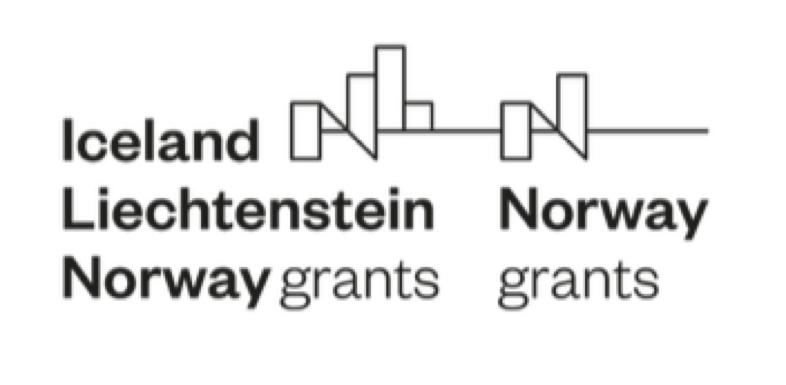


59
implemented activities.
us:
Born with the intention of sharing the results and updates of the projects participating to the Funds to showcase the main achievements of
Follow
www.youthemploymentmag.net www.regionalcoopmag.net
Contact us: themag@regionalfundsmag.net
fficial number: 3380/2019
contents of the Magazine are the sole responsibility of the authors and can in no way be taken to reflect the views of the Donors.
image: free image Regional Funds Online Magazine
FUND OPERATED BY:
O
The
Cover










 Our Irish Journalist
Our Irish Journalist












































